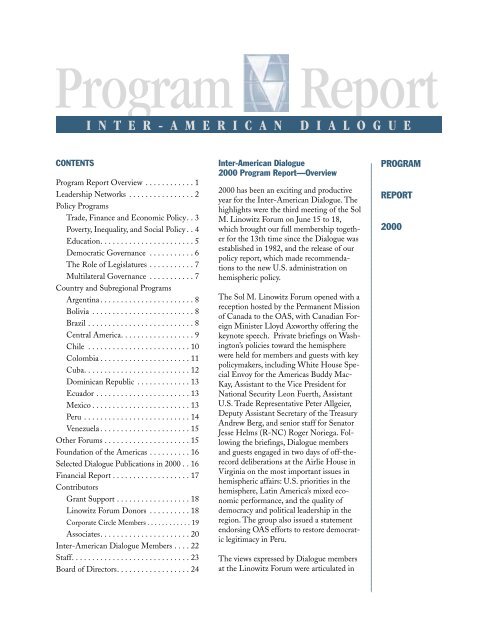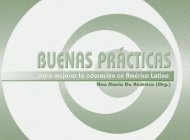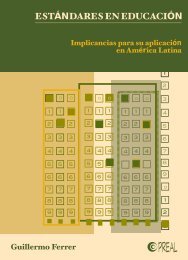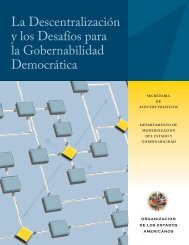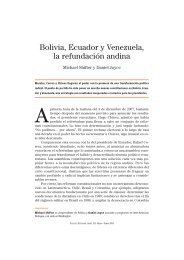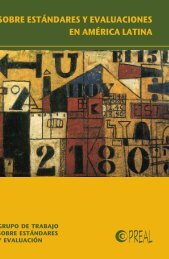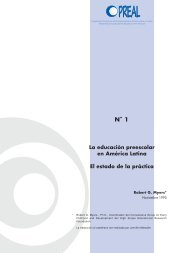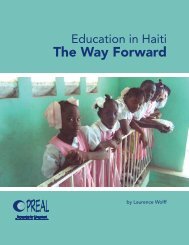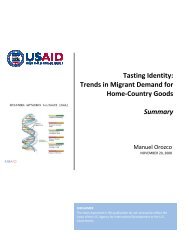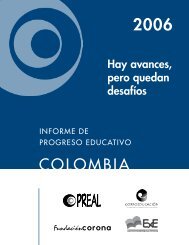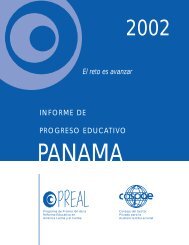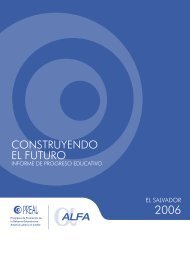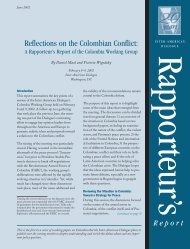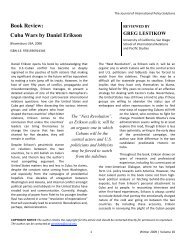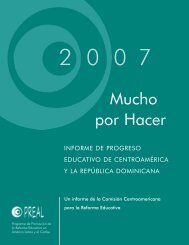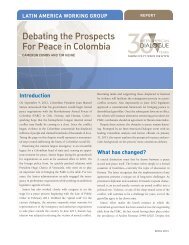Inter-American Dialogue
Inter-American Dialogue
Inter-American Dialogue
You also want an ePaper? Increase the reach of your titles
YUMPU automatically turns print PDFs into web optimized ePapers that Google loves.
Program Report<br />
CONTENTS<br />
INTER-AMERICAN DIALOGUE<br />
Program Report Overview . . . . . . . . . . . . 1<br />
Leadership Networks . . . . . . . . . . . . . . . . 2<br />
Policy Programs<br />
Trade, Finance and Economic Policy. . 3<br />
Poverty, Inequality, and Social Policy . . 4<br />
Education. . . . . . . . . . . . . . . . . . . . . . . 5<br />
Democratic Governance . . . . . . . . . . . 6<br />
The Role of Legislatures . . . . . . . . . . . 7<br />
Multilateral Governance . . . . . . . . . . . 7<br />
Country and Subregional Programs<br />
Argentina . . . . . . . . . . . . . . . . . . . . . . . 8<br />
Bolivia . . . . . . . . . . . . . . . . . . . . . . . . . 8<br />
Brazil . . . . . . . . . . . . . . . . . . . . . . . . . . 8<br />
Central America. . . . . . . . . . . . . . . . . . 9<br />
Chile . . . . . . . . . . . . . . . . . . . . . . . . . 10<br />
Colombia . . . . . . . . . . . . . . . . . . . . . . 11<br />
Cuba. . . . . . . . . . . . . . . . . . . . . . . . . . 12<br />
Dominican Republic . . . . . . . . . . . . . 13<br />
Ecuador . . . . . . . . . . . . . . . . . . . . . . . 13<br />
Mexico . . . . . . . . . . . . . . . . . . . . . . . . 13<br />
Peru . . . . . . . . . . . . . . . . . . . . . . . . . . 14<br />
Venezuela . . . . . . . . . . . . . . . . . . . . . . 15<br />
Other Forums . . . . . . . . . . . . . . . . . . . . . 15<br />
Foundation of the Americas . . . . . . . . . . 16<br />
Selected <strong>Dialogue</strong> Publications in 2000 . . 16<br />
Financial Report . . . . . . . . . . . . . . . . . . . 17<br />
Contributors<br />
Grant Support . . . . . . . . . . . . . . . . . . 18<br />
Linowitz Forum Donors . . . . . . . . . . 18<br />
Corporate Circle Members . . . . . . . . . . . . 19<br />
Associates. . . . . . . . . . . . . . . . . . . . . . 20<br />
<strong>Inter</strong>-<strong>American</strong> <strong>Dialogue</strong> Members . . . . 22<br />
Staff. . . . . . . . . . . . . . . . . . . . . . . . . . . . . 23<br />
Board of Directors. . . . . . . . . . . . . . . . . . 24<br />
<strong>Inter</strong>-<strong>American</strong> <strong>Dialogue</strong><br />
2000 Program Report––Overview<br />
2000 has been an exciting and productive<br />
year for the <strong>Inter</strong>-<strong>American</strong> <strong>Dialogue</strong>. The<br />
highlights were the third meeting of the Sol<br />
M. Linowitz Forum on June 15 to 18,<br />
which brought our full membership together<br />
for the 13th time since the <strong>Dialogue</strong> was<br />
established in 1982, and the release of our<br />
policy report, which made recommendations<br />
to the new U.S. administration on<br />
hemispheric policy.<br />
The Sol M. Linowitz Forum opened with a<br />
reception hosted by the Permanent Mission<br />
of Canada to the OAS, with Canadian Foreign<br />
Minister Lloyd Axworthy offering the<br />
keynote speech. Private briefings on Washington’s<br />
policies toward the hemisphere<br />
were held for members and guests with key<br />
policymakers, including White House Special<br />
Envoy for the Americas Buddy Mac-<br />
Kay, Assistant to the Vice President for<br />
National Security Leon Fuerth, Assistant<br />
U.S. Trade Representative Peter Allgeier,<br />
Deputy Assistant Secretary of the Treasury<br />
Andrew Berg, and senior staff for Senator<br />
Jesse Helms (R-NC) Roger Noriega. Following<br />
the briefings, <strong>Dialogue</strong> members<br />
and guests engaged in two days of off-therecord<br />
deliberations at the Airlie House in<br />
Virginia on the most important issues in<br />
hemispheric affairs: U.S. priorities in the<br />
hemisphere, Latin America’s mixed economic<br />
performance, and the quality of<br />
democracy and political leadership in the<br />
region. The group also issued a statement<br />
endorsing OAS efforts to restore democratic<br />
legitimacy in Peru.<br />
The views expressed by <strong>Dialogue</strong> members<br />
at the Linowitz Forum were articulated in<br />
PROGRAM<br />
REPORT<br />
2000
“The most<br />
important thing my<br />
colleagues in the<br />
<strong>American</strong> Congress can<br />
do is to lead by<br />
example—becoming<br />
active and continuing<br />
participants in efforts<br />
like the <strong>Inter</strong>-<strong>American</strong><br />
<strong>Dialogue</strong>’s parliamentary<br />
network. Congress could<br />
also help by providing<br />
financial support<br />
for initiatives like<br />
this one.<br />
”<br />
(Article by Senator<br />
Bob Graham in<br />
New York Times,<br />
December 24, 2000)<br />
2<br />
INTER-AMERICAN DIALOGUE<br />
2000 Program Report<br />
the <strong>Dialogue</strong>’s policy report A Time for<br />
Decisions: U.S. Policy in the Western Hemisphere.<br />
At a December 14 press briefing, the<br />
<strong>Dialogue</strong> presented the report’s recommendations<br />
to the Bush administration on<br />
reshaping U.S. policy toward Latin America.<br />
The report highlights recommendations<br />
to move forward with “fast track,” reach a<br />
trade agreement with Chile, and follow a<br />
new policy of engagement with Cuba.<br />
Other key recommendations include: the<br />
need for greater cooperation between the<br />
United States and both Mexico and Brazil,<br />
and the importance of continuing U.S. support<br />
for the Colombian government in its<br />
war against guerrillas. Emphasis was also<br />
given to the upcoming Summit of the<br />
Americas in Quebec City as a way to reinforce<br />
and amplify the U.S. commitment to<br />
a multilateral agenda.<br />
Other key <strong>Dialogue</strong> activities included initiatives<br />
designed to improve Latin America’s<br />
recent economic reforms; launch concrete<br />
recommendations for U.S. policy<br />
toward Brazil, Colombia and Cuba; analyze<br />
the latest political and economic developments<br />
in Argentina, Chile, Colombia,<br />
Mexico, Peru, Venezuela, and elsewhere;<br />
and enrich the quality of debate on U.S.<br />
policy toward Latin America and the<br />
Caribbean.<br />
We were pleased to have the opportunity to<br />
host President Miguel Angel Rodríguez of<br />
Costa Rica, President-Elect Hipólito Mejía<br />
of the Dominican Republic, as well as presidential<br />
candidates Francisco Arias Cárdenas<br />
of Venezuela, Alejandro Toledo of Peru,<br />
and Vicente Fox of Mexico, who was elected<br />
president on July 2. We also organized<br />
discussions with finance, defense and foreign<br />
ministers, trade leaders from throughout<br />
the hemisphere, as well as key policymakers<br />
from Washington and top analysts<br />
from Wall Street. And we assembled major<br />
conferences on a wide range of topics,<br />
including educational reform, legislative<br />
leadership, press freedom, race and ethnicity,<br />
Central <strong>American</strong> integration, women in<br />
political power, and the future of Western<br />
Hemisphere affairs.<br />
Leadership Networks<br />
The <strong>Dialogue</strong>’s networks incorporate public<br />
and private leaders from throughout the<br />
hemisphere to address critical inter-<strong>American</strong><br />
policy issues. They reflect the changes<br />
in leadership in the hemisphere, enhance<br />
communication across countries, and<br />
engage new groups of analysts and practitioners<br />
in the <strong>Dialogue</strong>’s activities.<br />
� The second meeting of the Network of<br />
Legislative Leaders—organized by the<br />
<strong>Dialogue</strong> in cooperation with the Organization<br />
of <strong>American</strong> States (OAS)—<br />
took place on April 1 and 2 in San José,<br />
Costa Rica. This politically diverse group<br />
of some 50 selected legislative leaders<br />
from the United States, Canada and 14<br />
Latin <strong>American</strong> and Caribbean countries<br />
discussed challenges facing the hemisphere’s<br />
legislatures and identified ways<br />
to improve their performance. OAS Secretary<br />
General César Gaviria, White<br />
House Special Envoy Buddy MacKay,<br />
and Costa Rican President Miguel Angel<br />
Rodríguez also participated. As part of<br />
the network’s efforts, Chairman Bill Graham<br />
of the Foreign Relations Committee<br />
of the Canadian Parliament and U.S.<br />
Senator Bob Graham traveled to Brazil<br />
and Bolivia with <strong>Dialogue</strong> president<br />
Peter Hakim in January for a series of<br />
meetings with key congressional leaders,<br />
corporate executives, and senior government<br />
officials, including Brazilian President<br />
Fernando Henrique Cardoso and<br />
Bolivian Vice President Jorge Quiroga.<br />
They were joined by senior advisor to<br />
President Clinton’s special envoy for the<br />
Americas, Alexandra Arriaga.<br />
� The newly formed steering committee of<br />
the Women’s Leadership Conference of<br />
the Americas (WLCA)—the five year-
old network co-sponsored by the <strong>Dialogue</strong><br />
with the <strong>Inter</strong>national Center for<br />
Research on Women (ICRW)—met on<br />
April 14. Under its new co-chairs, former<br />
Venezuelan Central Bank president Ruth<br />
de Krivoy and Peruvian congressional<br />
leader Lourdes Flores Nano, the committee<br />
agreed that the WLCA’s chief mission<br />
is to promote and strengthen<br />
women’s leadership in the corporate sector,<br />
politics, government, and academic<br />
and scientific fields. On November 13,<br />
the WLCA convened—with the <strong>Inter</strong>-<br />
<strong>American</strong> Development Bank (IDB) and<br />
ICRW—50 of the hemisphere’s leading<br />
female politicians. Prominent participants<br />
included São Paulo Mayor-Elect<br />
Marta Suplicy, Deputy Prime Minister<br />
Billie Miller of Barbados, and former vice<br />
president of Costa Rica Rebeca<br />
Grynspan. Participants in “Politics Matters:<br />
A <strong>Dialogue</strong> of Women Political<br />
Leaders” reviewed the key economic and<br />
political challenges confronting the<br />
hemisphere, and considered how the<br />
results of a Gallup poll on public attitudes<br />
toward women in power would<br />
affect their own electoral and political<br />
strategies. On March 21, the WLCA cohosted<br />
with the IDB a forum on the<br />
prospects for increasing women’s participation<br />
in the labor force in Latin America<br />
and the Caribbean in the face of the<br />
region’s new demographic trends.<br />
� The Group of Fifty––an assembly of<br />
prominent Latin <strong>American</strong> business<br />
leaders co-sponsored with the Carnegie<br />
Endowment for <strong>Inter</strong>national Peace—<br />
held its Seventh Annual Meeting in<br />
Washington, D.C. and St. Michaels,<br />
Maryland from 13 to 17 September. The<br />
meeting gave special attention to how the<br />
<strong>Inter</strong>net is affecting and transforming<br />
companies and society in Latin America<br />
and globally.<br />
� The Corporate Circle was formed in<br />
1998 to increase the involvement of busi-<br />
ness and financial leaders in <strong>Dialogue</strong><br />
activities. The Circle is currently comprised<br />
of nearly 80 members, including<br />
Arnold & Porter, AT&T, BankBoston,<br />
Bell South, Burson-Marsteller, Cervecería<br />
Polar, Chase Manhattan Bank, Cisneros<br />
Group of Companies, Constellation<br />
Power, Eli Lilly & Co., Ford Motor<br />
Company, Frank Russell Company, General<br />
Electric Company, <strong>Inter</strong>national<br />
Advisory Group, Johnson & Johnson,<br />
McGraw Hill Companies, Merck, Mitsubishi<br />
<strong>Inter</strong>national, O’Melveny &<br />
Myers, StarMedia, Texaco, Time Warner,<br />
Warnaco, and W&M Properties. The<br />
Corporate Circle enhances communication<br />
among corporate and government<br />
leaders in the hemisphere, and allows for<br />
a structured, ongoing exchange on policy<br />
issues affecting trade, investment, and<br />
economic development in Latin America<br />
and the Caribbean. (See page 22 for a full<br />
listing of Corporate Circle Members.)<br />
Policy Programs<br />
Trade, Finance and Economic Policy<br />
� On September 20, the <strong>Dialogue</strong> joined<br />
with Caribbean/Latin <strong>American</strong> Action<br />
(C/LAA) to sponsor a conference on the<br />
challenges of offshore finance in the<br />
Caribbean. The all-day meeting assembled<br />
leaders and analysts from the<br />
Caribbean and United States to review<br />
the burgeoning offshore finance industry—including<br />
its important economic<br />
contribution to the small islands of the<br />
Caribbean; its potential for money laundering,<br />
corruption, and other abuses; and<br />
the implications for the United States<br />
and the region.<br />
� On November 10, a select corporate<br />
audience exchanged views with Latinobarometro<br />
executive director Marta<br />
Lagos about Latin <strong>American</strong> public attitudes<br />
on issues of concern to business.<br />
“The<br />
<strong>Inter</strong>-<strong>American</strong> <strong>Dialogue</strong><br />
brought together more<br />
than three dozen female<br />
political figures from<br />
Latin America. The<br />
polÍticas disagreed on<br />
whether women execute<br />
public office differently<br />
from their male<br />
counterparts. But they<br />
concurred on one<br />
important point: Women<br />
are reshaping the<br />
political agenda.<br />
”<br />
(Latin Trade,<br />
February 2001)<br />
INTER-AMERICAN DIALOGUE<br />
2000 Program Report<br />
3
“Our 10 ‘equity<br />
tools’ suggest what<br />
governments could do<br />
to build more just<br />
4<br />
societies, without<br />
sacrificing economic<br />
efficiency and<br />
growth.<br />
”<br />
(Washington Contentious:<br />
Economic Policies for<br />
Social Equity in Latin<br />
America, <strong>Inter</strong>-<strong>American</strong><br />
<strong>Dialogue</strong> and Carnegie<br />
Endowment for<br />
<strong>Inter</strong>national Peace)<br />
INTER-AMERICAN DIALOGUE<br />
2000 Program Report<br />
� The 4th Annual Andean Development<br />
Corporation (CAF) Conference on Trade<br />
& Investment in the Americas took place<br />
September 7 to 8 in Washington, D.C.<br />
The widely attended event featured the<br />
participation of top Andean Community<br />
economic officials and Wall Street and<br />
country analysts. The conference marked<br />
the 30th anniversary of CAF, which is<br />
now the largest development bank in<br />
Latin America––with spending in the<br />
region that rivals the IDB and the World<br />
Bank. The all-day conference was an<br />
opportunity to review political and economic<br />
developments in the troubled<br />
Andean region and their wider significance<br />
for Latin America.<br />
� More than forty public and private leaders<br />
from the Caribbean Basin and the<br />
United States met on June 14 at an <strong>Inter</strong>-<br />
<strong>American</strong> <strong>Dialogue</strong> roundtable to discuss<br />
the impact of the recently passed Caribbean<br />
Basin Initiative (CBI) enhancement<br />
legislation on Central America and the<br />
Caribbean. The session was chaired by<br />
Senator Bob Graham (D-FL), Representative<br />
Jim Kolbe (R-AR), and White<br />
House Special Envoy for the Americas<br />
Buddy MacKay. Participants included<br />
Associate U.S. Trade Representative<br />
Peter Allgeier.<br />
� The <strong>Dialogue</strong>’s Trade Policy Group and<br />
the Carnegie Economic Reform Network<br />
(CERN) are developing a paper on how<br />
to pursue labor rights protections in free<br />
trade negotiations. On February 14, The<br />
<strong>Dialogue</strong> and CERN hosted World<br />
Trade Organization (WTO) Deputy<br />
Director Miguel Rodríguez to brief the<br />
group on the challenges facing the multilateral<br />
body after Seattle. The joint project<br />
hosted an exchange on March 15 on<br />
questions surrounding the inclusion of<br />
labor standards enforcement in trade<br />
talks. Among the participants were Jaime<br />
Serra Puche, the former Mexican trade<br />
and finance minister, Gary Hufbauer of<br />
the Institute for <strong>Inter</strong>national Economics,<br />
and Thea Lee of the AFL-CIO.<br />
Poverty, Inequality, and Social Policy<br />
� On October 23, the <strong>Dialogue</strong> joined with<br />
the Brookings Institution and Carnegie<br />
Endowment for <strong>Inter</strong>national Peace to<br />
host a day-long conference to discuss<br />
some of the most critical issues identified<br />
in the recently published World Bank’s<br />
2000/01 World Development Report<br />
(WDR). The event, led off by World<br />
Bank President James D. Wolfensohn,<br />
used the latest WDR report as a springboard<br />
to review the persistent problems<br />
of poverty and inequality worldwide, and<br />
analyze proposals for confronting them.<br />
Among the issues examined were globalization,<br />
technology, race and ethnicity,<br />
and debt relief.<br />
� The <strong>Dialogue</strong> and the Carnegie Endowment<br />
for <strong>Inter</strong>national Peace convened a<br />
commission to formulate policies to spur<br />
economic growth with equity in Latin<br />
America. The results were published in a<br />
report, Washington Contentious, and distributed<br />
to leaders across the hemisphere.<br />
The initiative–– co-chaired by Nancy<br />
Birdsall of Carnegie and Augusto de la<br />
Torre of the World Bank––was launched<br />
in response to the region’s mediocre<br />
growth and limited progress in reducing<br />
income inequality over the past decade.<br />
Commission members include Shahid<br />
Javed Burki of EMP Financial Advisors,<br />
Moisés Naím of Foreign Policy, Guillermo<br />
Perry of the World Bank, and John<br />
Williamson of the Institute for <strong>Inter</strong>national<br />
Economics, among others.<br />
� In collaboration with the World Bank<br />
and <strong>Inter</strong>-<strong>American</strong> Development Bank<br />
(IDB), the <strong>Dialogue</strong> has held an interagency<br />
consultation on the situation of<br />
Afro-Latin <strong>American</strong>s in response to<br />
widespread discrimination and prejudice,<br />
and their relationship with the extreme
poverty of blacks in most countries. The<br />
initiative brings together representatives<br />
of Afro-Latin communities with officials<br />
of the international financial institutions<br />
and other development experts. The first<br />
consultation meeting on June 19 focused<br />
on the impact of legal frameworks on the<br />
rights of Afro-Latin <strong>American</strong>s, the role<br />
of civil society groups working on Afro-<br />
Latin <strong>American</strong> issues, and race and ethnicity<br />
as political issues in Latin America.<br />
Panelists included Senator Piedad Córdoba<br />
of Colombia, <strong>Dialogue</strong> member<br />
Dulce María Pereira of Fundação Cultural<br />
Palmares in Brazil, Romero Rodríguez<br />
of Mundo Afro in Uruguay, and Lynn<br />
Walker-Huntley of the U.S. Southern<br />
Education Foundation.<br />
� The <strong>Dialogue</strong> and <strong>Inter</strong>-<strong>American</strong><br />
Development Bank (IDB) co-hosted on<br />
June 13 a forum on politics and institutions<br />
in Latin America, drawing on the<br />
IDB’s recently published report on economic<br />
and social progress in Latin<br />
America, Development Beyond Economics.<br />
With IDB chief economist Ricardo<br />
Hausmann leading the discussion, the<br />
first session of the forum centered on<br />
political reforms required in Latin America.<br />
The second session focused on efforts<br />
to identify a research agenda for the relationship<br />
between economics, institutions<br />
and politics in Latin America.<br />
� The <strong>Dialogue</strong> co-hosted two discussions<br />
on the impact of Latin America’s recent<br />
economic reforms. On May 31, Ricardo<br />
Ffrench-Davis of the Economic Commission<br />
for Latin America and the<br />
Caribbean (ECLAC), who is the author<br />
of the recently published Reforming the<br />
Reforms, offered a provocative address<br />
calling for Latin <strong>American</strong> countries to<br />
reshape their reform efforts to make<br />
them more effective and more equitable.<br />
A new nine-country study by ECLAC<br />
economists Barbara Stallings and Wilson<br />
Peres, titled Growth, Employment, and<br />
Equity: The Impact of the Economic<br />
Reforms in Latin America and the<br />
Caribbean, was unveiled in a March 6<br />
session with the participation of IMF<br />
deputy managing director Eduardo Aninat<br />
and World Bank chief economist<br />
Guillermo Perry.<br />
� On September 7, the <strong>Dialogue</strong> hosted the<br />
release of a major study on justice and<br />
equity in Latin America, Acceso a la Justicia<br />
y Equidad, carried out by the <strong>Inter</strong>-<strong>American</strong><br />
Institute of Human Rights (IIDH).<br />
At the session, IIDH Director Roberto<br />
Cuellar presented the report’s findings.<br />
� On June 28, the <strong>Dialogue</strong> and Carnegie<br />
hosted a discussion on the recent book,<br />
Distributive Justice & Economic Development:<br />
The Case of Chile and Developing<br />
Countries, co-edited by Eduardo Aninat of<br />
the IMF, Nancy Birdsall of Carnegie, and<br />
Andrés Solimano of the World Bank.<br />
Education<br />
� On September 7, the <strong>Dialogue</strong>’s Program<br />
for Educational Revitalization in<br />
the Americas (PREAL) honored President<br />
Ricardo Lagos of Chile for his commitment<br />
to education reform with the<br />
first PREAL award for distinguished service<br />
to education in the Americas. Participating<br />
in the ceremony at New York<br />
University were PREAL education task<br />
force co-chair José Octavio Bordón,<br />
CINDE President Osvaldo Sunkel, IDB<br />
President Enrique Iglesias, Clinton Special<br />
Envoy for the Americas Buddy<br />
MacKay, Chilean Foreign Minister<br />
Soledad Alvear, former congressman and<br />
president emeritus of NYU John Brademas,<br />
current NYU President L. Jay Oliva,<br />
and Jorge Castañeda, advisor to Mexican<br />
President-Elect Vicente Fox.<br />
� On July 15 and 16, PREAL’s Task Force<br />
on Education Reform in Central America<br />
met in Guatemala City, Guatemala to<br />
“Ministries of<br />
education are often<br />
more part of the<br />
problem than part of the<br />
solution…Any hope for<br />
education reform<br />
depends on mobilizing<br />
civil society to exert the<br />
pressure required to<br />
bring about change in<br />
the shortest possible<br />
time."<br />
”<br />
(Tomorrow Is Too Late,<br />
PREAL Task Force on<br />
Education Reform in<br />
Central America)<br />
INTER-AMERICAN DIALOGUE<br />
2000 Program Report<br />
5
“According to<br />
a report by an influential<br />
Washington-based think-<br />
tank, the <strong>Inter</strong>-<strong>American</strong><br />
6<br />
<strong>Dialogue</strong>…current<br />
U.S. policy needs to<br />
be revised…<br />
The report warns that<br />
new multilateral<br />
initiatives––including<br />
quick moves to revive<br />
the FTAA, a revamp of<br />
regional institutions<br />
and the study of a<br />
possible common<br />
currency––are needed<br />
to head off further drift<br />
in hemispheric relations."<br />
”<br />
(Financial Times,<br />
December 18, 2000)<br />
INTER-AMERICAN DIALOGUE<br />
2000 Program Report<br />
launch its comprehensive report, Mañana<br />
es Muy Tarde. In addition to 13 members<br />
of the Task Force, more than 120<br />
Guatemalan political, business and civil<br />
society leaders attended, along with representatives<br />
of PREAL’s associated centers<br />
in Central America, and PREAL<br />
staff. The report calls for an increase of<br />
public investment in education, transferring<br />
the management of the educational<br />
system, renewal of the teaching profession,<br />
and the establishment of common<br />
standards for all countries. The launch<br />
included presentations on the report by<br />
task force co-chairs Ricardo Maduro<br />
(Honduras) and Cecilia Gallardo (El Salvador)<br />
and an address by Minister of<br />
Education Mario Torres.<br />
� On October 26 and 27, PREAL’s Task<br />
Force on Education Reform in Central<br />
America held their fourth meeting in<br />
Santo Domingo, Dominican Republic.<br />
The group met to discuss a plan of work<br />
for 2001 and to formally launch their<br />
report—Mañana es Muy Tarde—in the<br />
Dominican Republic. Members met privately<br />
with President Hipólito Mejía and<br />
Vice President (and Minister of Education)<br />
Milagros Ortíz Bosch at the national<br />
palace to present them with copies of<br />
the report.<br />
� On May 15 and 16, PREAL organized,<br />
in collaboration with the Brazilian Council<br />
of State Secretaries of Education<br />
(CONSED), a conference on school<br />
autonomy in Recife, Brazil. Speakers<br />
shared experiences ranging from the<br />
charter school movement in the United<br />
States to the impact of Nicaragua’s<br />
autonomous schools program. PREAL<br />
co-director Marcela Gajardo was invited<br />
to Brasilia on January 24 and 25 to participate<br />
in a meeting, “New Partnerships<br />
to Develop Poverty Reduction Strategies,”<br />
organized by Brazil’s First Lady,<br />
Ruth Cardoso.<br />
� In July, the <strong>Dialogue</strong> co-hosted with the<br />
<strong>Inter</strong>-<strong>American</strong> Development Bank a<br />
roundtable discussion with Brazilian Minister<br />
of Education Paulo Renato Souza,<br />
who discussed his efforts over the past six<br />
years to reform education policy in Brazil.<br />
Democratic Governance<br />
� On September 29 and 30, the <strong>Dialogue</strong><br />
hosted a conference on democratic governance<br />
in the Americas that convened the<br />
thirteen contributing authors to the second<br />
edition of Constructing Democratic<br />
Governance to be published by Johns<br />
Hopkins University Press late next year.<br />
During the first day’s open session, project<br />
director Jorge Domínguez of Harvard<br />
led a discussion among the book<br />
authors and representatives from the<br />
Washington policy community to examine<br />
challenges to democratic governance<br />
faced by Colombia, Peru, Venezuela,<br />
Mexico, Argentina, and Chile. Issues<br />
included the importance of political leadership<br />
in the face of weak institutions and<br />
the widespread collapse of traditional<br />
political parties. On the second day, the<br />
authors met in closed session and focused<br />
on the thematic chapters on civil-military<br />
relations, labor and unemployment,<br />
women’s participation in politics, public<br />
opinion, market reforms, and executivelegislative<br />
relations.<br />
� The <strong>Dialogue</strong> has launched a multi-year<br />
project on “Advancing Democracy<br />
through Press Freedom in the Americas”<br />
with the support of the McCormick Tribune<br />
Foundation. The initiative aims to<br />
generate discussion among publishers,<br />
editors, reporters, and government officials<br />
on how to overcome obstacles to<br />
freedom of the press in the hemisphere.<br />
U.S., Latin <strong>American</strong> and Caribbean<br />
participants from these sectors convened<br />
for the first of the project’s three annual<br />
meetings on January 21 and 22 in Washington.<br />
They discussed intimidation and
harassment of the press, legal limitations<br />
on freedom of expression, mechanisms to<br />
improve media practices, and the role of<br />
non-governmental organizations in<br />
expanding press freedoms. Workshop<br />
leaders included <strong>Dialogue</strong> members Jack<br />
Fuller, president of the Tribune Publishing<br />
Company, and Oliver Clarke, chairman<br />
and managing director of the<br />
Gleaner Company in Jamaica. Argentina’s<br />
Minister of Justice Ricardo Gil Lavedra<br />
gave a special presentation.<br />
The Role of Legislatures<br />
� With support from the Tinker Foundation,<br />
the <strong>Dialogue</strong> convened on August<br />
28 the authors of its forthcoming book<br />
on the role of legislatures in Latin America.<br />
The publication will provide an<br />
analysis of the role of congress in<br />
Argentina, Brazil, Colombia, Costa Rica,<br />
the Dominican Republic, and Mexico.<br />
This all-day working group meeting was<br />
directed by Brazilian analyst Bolívar<br />
Lamounier, who is also a <strong>Dialogue</strong> member<br />
and editor of the volume.<br />
Multilateral Governance<br />
� On December 4, the <strong>Dialogue</strong> joined the<br />
Canadian Foundation for the Americas<br />
(FOCAL) in hosting a day-long conference<br />
on the next Summit of the Americas––scheduled<br />
for April 2001 in Quebec<br />
City, Canada. Participants analyzed the<br />
accomplishments and failures of the first<br />
two summits, considered the agenda and<br />
objectives for the upcoming one in Canada,<br />
and speculated on the role of the<br />
summit as an institution, including its<br />
relation to the OAS. Participants included:<br />
Canadian Assistant Deputy Minister<br />
of Foreign Relations George Haynal,<br />
representative of the prime minister Marc<br />
Lortie, and current and former White<br />
House special envoys Buddy MacKay<br />
and Mack McLarty.<br />
� With the support of an overwhelming<br />
majority of hemispheric governments,<br />
<strong>Dialogue</strong> senior fellow Luigi Einaudi was<br />
elected assistant secretary-general of the<br />
Organization of <strong>American</strong> States (OAS)<br />
at its General Assembly meeting on June<br />
6 in Windsor, Canada. Secretary-General<br />
César Gaviria applauded the election,<br />
stating that “Ambassador Einaudi has<br />
been an outstanding diplomat and a great<br />
friend of the Americas…” In a press conference<br />
in Windsor, Einaudi said that the<br />
greatest problem facing the OAS “is its<br />
lack of money” and indicated his commitment<br />
to search for financing from the<br />
United States.<br />
� At the OAS General Assembly meeting<br />
in Windsor in June, the <strong>Dialogue</strong><br />
released its recently published working<br />
paper, Reflexiones Sobre el Futuro del Sistema<br />
<strong>Inter</strong>americano de Derechos Humanos<br />
(Reflections on the Future of the <strong>Inter</strong>-<br />
<strong>American</strong> Human Rights System), by Carlos<br />
M. Ayala. The paper suggests ways<br />
the inter-<strong>American</strong> human rights system<br />
can be strengthened, and confidence in it<br />
improved. An English translation is<br />
forthcoming.<br />
� <strong>Dialogue</strong> president Peter Hakim and<br />
senior fellow Luigi Einaudi traveled to<br />
Ottawa and Toronto on February 24 and<br />
25 to discuss Latin America and U.S.<br />
policy toward the region with Canada’s<br />
public and private sector leaders. In<br />
Ottawa, Hakim and Einaudi met with<br />
Foreign Minister Lloyd Axworthy, Assistant<br />
Deputy Minister George Haynal,<br />
special summit envoy Michael Brock, and<br />
others. The Canadian Foundation for the<br />
Americas (FOCAL)—with which the<br />
<strong>Dialogue</strong> is cooperating on a range of<br />
issues related to the Quebec City Summit<br />
of the Americas in April 2001—<br />
organized a breakfast at the National<br />
Press Club, where Hakim and Einaudi<br />
engaged nearly 100 representatives of the<br />
local policy community on the prospects<br />
“In a report<br />
published earlier this<br />
month, <strong>Inter</strong>-<strong>American</strong><br />
<strong>Dialogue</strong> argued that<br />
it would be possible<br />
to tackle such problems<br />
[as Colombia] only<br />
by building a more<br />
multilateral approach<br />
to policy and<br />
reinforcing regional<br />
institutions.<br />
”<br />
(Financial Times,<br />
December 2000)<br />
INTER-AMERICAN DIALOGUE<br />
2000 Program Report<br />
7
“For the first<br />
time, the Latin <strong>American</strong><br />
members wanted to talk<br />
directly to the new U.S.<br />
president. The Latin<br />
<strong>American</strong>s wanted a<br />
platform to say that<br />
the U.S. can be helpful<br />
in solving problems<br />
but that we have to<br />
work together,’ said<br />
Peter Hakim, president<br />
of the <strong>Inter</strong>-<strong>American</strong><br />
<strong>Dialogue</strong>.<br />
”<br />
(The Washington Post,<br />
December 15, 2000)<br />
8<br />
INTER-AMERICAN DIALOGUE<br />
2000 Program Report<br />
for inter-<strong>American</strong> relations. In Toronto,<br />
Barbara McDougall, a <strong>Dialogue</strong> Board<br />
member and president of the Canadian<br />
Institute of <strong>Inter</strong>national Affairs,<br />
arranged an interview with Globe and<br />
Mail, a roundtable breakfast with private<br />
sector leaders, and a luncheon hosted by<br />
the Bank of Nova Scotia.<br />
Country and Subregional Programs<br />
Argentina<br />
� On May 18, the <strong>Dialogue</strong> hosted a<br />
breakfast discussion with Ricardo López<br />
Murphy, Argentina’s minister of defense.<br />
López Murphy addressed the main security<br />
challenges facing Argentina, outlined<br />
the top defense priorities of the de la Rúa<br />
administration, and highlighted the<br />
active role Argentina plays in peacekeeping<br />
operations throughout the world.<br />
� Three top Wall Street analysts took part<br />
in a roundtable discussion hosted by the<br />
<strong>Dialogue</strong> and the Latin America Advisor<br />
on April 25. Chase Securities’ Joyce<br />
Chang, Warburg Dillon Read’s Michael<br />
Gavin, and ING Barings’ Fernando<br />
Losada offered their perspectives on the<br />
economic challenges and opportunities<br />
facing the recently seated de la Rúa<br />
administration in Buenos Aires.<br />
� On November 3, minister of education of<br />
the Province of Buenos Aires José<br />
Octavio Bordón analyzed the political<br />
crisis facing the Argentine government in<br />
the wake of the resignation of Vice President<br />
“Chacho” Alvarez.<br />
� On October 27, the <strong>Dialogue</strong> hosted a<br />
breakfast session for Argentine Secretary<br />
of Finance Daniel Marx, who presented<br />
his views on debt, economic strategy, and<br />
politics.<br />
Bolivia<br />
� Ronald MacLean, Bolivia’s minister of<br />
finance, addressed a select audience at a<br />
luncheon on May 24. MacLean discussed<br />
Bolivia’s latest political and economic<br />
developments and future challenges to<br />
the country’s reform agenda.<br />
Brazil<br />
� The <strong>Dialogue</strong>’s new program on Brazil<br />
and U.S.-Brazilian relations expanded its<br />
activities in 2000. The program is<br />
designed to improve the quality of information<br />
and analysis that reaches U.S.<br />
policy, media, and corporate communities<br />
about critical political and economic<br />
developments in Brazil; provide Brazilian<br />
government officials and private leaders<br />
with independent and balanced assessments<br />
of the United States and its foreign<br />
policies; and strengthen communication<br />
among public and private leaders in<br />
both countries.<br />
� The Brazil program hosted a series of<br />
events in Washington to generate debate<br />
on the most pressing political, economic,<br />
and security issues facing the South<br />
<strong>American</strong> country. On November 29,<br />
Johns Hopkins’ SAIS program director<br />
Riordan Roett, Washington correspondent<br />
for O Estado de São Paulo Paulo<br />
Sotero, and <strong>Dialogue</strong> senior associate<br />
Paulo Wrobel addressed a breakfast<br />
roundtable on Brazilian politics in the<br />
aftermath of local elections. At a <strong>Dialogue</strong><br />
luncheon on November 10, special<br />
representative of the Brazilian president<br />
for Mercosur affairs José Botafogo discussed<br />
Brazilian and Mercosur trade policy.<br />
On September 19, the <strong>Dialogue</strong> hosted<br />
a breakfast on the first-ever South<br />
<strong>American</strong> Presidential Summit featuring<br />
Brazilian Ambassador Rubens Barbosa,<br />
Argentine Ambassador Guillermo Enrique<br />
González and Colombian Ambassador<br />
Luis Alberto Moreno. On June 29,
the <strong>Dialogue</strong>, in collaboration with the<br />
Center for Hemispheric Defense Studies,<br />
organized a breakfast discussion featuring<br />
Geraldo Quintão, Brazilian minister of<br />
defense, who discussed Brazil’s defense<br />
and security policies and the role of the<br />
armed forces and civil society in designing<br />
a new defense policy. The future of Mercosur<br />
was the topic of a roundtable on<br />
May 4, featuring Mónica Hirst, executive<br />
director of the Buenos Aires-based Center<br />
for Brazilian Studies Foundation. On<br />
April 12, Raúl Jungmann, Brazil’s minister<br />
of agrarian development, and Vilmar<br />
Faria, chief advisor to President Cardoso,<br />
spoke at a luncheon on Brazilian social<br />
development. Paulo Sotero, Washington<br />
correspondent for O Estado de Sao Paulo,<br />
and David Fleischer, political analyst and<br />
editor of Brazil Focus discussed Brazil’s<br />
latest political developments at a January<br />
18 roundtable session. Finally, on 13 January,<br />
to mark the first anniversary of the<br />
devaluation of the Brazilian currency real,<br />
the <strong>Dialogue</strong> featured former president of<br />
the Brazilian National Development<br />
Bank Edmar Bacha, leading U.S. economic<br />
analyst on Brazil Albert Fishlow,<br />
and Chase Manhattan Bank chief emerging<br />
market strategist Joyce Chang to discuss<br />
Brazil’s economic prospects.<br />
� The <strong>Dialogue</strong> also paid keen attention to<br />
U.S.-Brazil ties. On March 29, Brazil’s<br />
Foreign Minister Luiz Felipe Lampreia<br />
addressed a breakfast roundtable meeting<br />
co-organized with the Brookings Institution<br />
and Carnegie Endowment for <strong>Inter</strong>national<br />
Peace. Lampreia gave an assessment<br />
of the current state of Brazil-U.S.<br />
bilateral relations, followed by commentary<br />
by Deputy U.S. Trade Representative<br />
Richard Fisher. On April 18, the<br />
<strong>Dialogue</strong> hosted a special forum on U.S.-<br />
Brazil trade relations, which included<br />
panels on bilateral issues and multilateral<br />
dimensions of trade negotiations. Participants<br />
included chairman of Brazil’s Foreign<br />
Trade Council Roberto Giannetti da<br />
Fonseca, Brazilian Ambassador Rubens<br />
Barbosa, Associate U.S. Trade Representative<br />
Peter Allgeier, and senior fellow of<br />
the Institute for <strong>Inter</strong>national Economics<br />
Gary Hufbauer.<br />
Central America<br />
� A key goal of the <strong>Dialogue</strong>’s Central<br />
America program has been to raise its<br />
profile in the region, and to forge cooperative<br />
relationships with organizations and<br />
individuals. Toward that end, Central<br />
America program director Manuel Orozco<br />
conducted in July a two-week trip to<br />
the region where he visited over fifty different<br />
groups.<br />
� In Guatemala on September 8, the <strong>Dialogue</strong><br />
co-sponsored, with Rafael Landívar<br />
University, an international conference on<br />
multiculturalism in the Americas. The<br />
conference brought experts from Brazil,<br />
Costa Rica, Nicaragua, Mexico, the<br />
Andean region, and the United States to<br />
speak about how cultural minorities<br />
respond to challenges from dominant<br />
groups in multicultural societies. As a follow-up<br />
to this conference, in October the<br />
Central America program brought a delegation<br />
of seven young Guatemalan leaders<br />
to the Andean region to participate in<br />
a series of <strong>Dialogue</strong> co-sponsored workshops<br />
on interculturalism. The group met<br />
with indigenous leaders in government<br />
and other important political positions in<br />
Peru and Ecuador.<br />
� In San Salvador on November 6, the<br />
<strong>Dialogue</strong>’s Central America program<br />
released major studies produced by its<br />
Central America 2020 project. This initiative<br />
is designed to offer long-term policy<br />
proposals for the countries of the<br />
region––on topics ranging from the environment,<br />
to poverty, democracy, migration,<br />
regional integration, economic<br />
growth, rule of law, public security, and<br />
globalization. The event––co-hosted with<br />
“In at least five<br />
Central <strong>American</strong><br />
countries––Guatemala,<br />
El Salvador, Nicaragua,<br />
the Dominican Republic,<br />
and Honduras––<br />
current levels of public<br />
investment in primary<br />
and secondary<br />
education are grossly<br />
inadequate and fall well<br />
below those of other<br />
parts of Latin America.<br />
”<br />
(Tomorrow Is Too Late,<br />
PREAL Task Force on<br />
Education Reform in<br />
Central America)<br />
INTER-AMERICAN DIALOGUE<br />
2000 Program Report<br />
9
“Colombia's core,<br />
underlying problem is<br />
one of state authority<br />
and the maintenance<br />
of public order. The<br />
critical problem is the<br />
capacity to govern…<br />
10<br />
A comprehensive<br />
approach––one that<br />
embraces military,<br />
political, economic, and<br />
social elements––can<br />
best contribute to a<br />
durable and effective<br />
solution.<br />
”<br />
(Toward Greater Peace and<br />
Security in Colombia,<br />
<strong>Inter</strong>-<strong>American</strong><br />
<strong>Dialogue</strong> and Council<br />
on Foreign Relations Task<br />
Force Report)<br />
INTER-AMERICAN DIALOGUE<br />
2000 Program Report<br />
the Center for Latin <strong>American</strong> and<br />
Caribbean Studies at Florida <strong>Inter</strong>national<br />
University, the Institute for<br />
Iberoamerican Studies in Hamburg, and<br />
the Secretaria de la Integración Centro<br />
<strong>American</strong>a (SICA), based in San Salvador––was<br />
organized by the <strong>Dialogue</strong><br />
and brought 150 public and private sector<br />
participants from the seven Central<br />
<strong>American</strong> countries, as well as from<br />
Mexico, Venezuela, Uruguay, Europe,<br />
and the United States.<br />
� On April 6 and 7, the <strong>Dialogue</strong>’s Central<br />
America program joined the Canadian<br />
Foundation for the Americas (FOCAL)<br />
and the Central <strong>American</strong> Bank for Economic<br />
Integration (CABEI) in hosting a<br />
meeting with public and private leaders<br />
from Central America, the United States,<br />
and Canada at CABEI headquarters in<br />
Tegucigalpa, Honduras. Participants<br />
sought to identify mechanisms to promote<br />
Central <strong>American</strong> integration and<br />
the region’s insertion into the global<br />
economy. The <strong>Dialogue</strong>, FOCAL, and<br />
CABEI plan to organize a similar meeting<br />
in early 2001, and to develop policy<br />
recommendations for the Central <strong>American</strong><br />
governments and the international<br />
community.<br />
� President Miguel Angel Rodríguez of<br />
Costa Rica led a roundtable discussion on<br />
May 8 co-hosted with the Brookings<br />
Institution and Carnegie Endowment.<br />
� In the spring, the <strong>Dialogue</strong> and the<br />
Tomás Rivera Policy Institute (TRPI)<br />
organized two roundtable discussions and<br />
published a series of working papers on<br />
the potential contribution of remittances<br />
to social and economic development in<br />
Latin America and the Caribbean—as<br />
well as to the economic and social wellbeing<br />
of Latino communities in the<br />
United States. Remittances from the<br />
United States to Mexico and Central<br />
America alone amount to nearly $10 bil-<br />
lion a year. In several Latin <strong>American</strong><br />
and Caribbean countries, remittances<br />
rival inflows from trade and investment.<br />
� In addition to hosting events, the Central<br />
America program represented the <strong>Dialogue</strong><br />
in various conferences and talks<br />
sponsored by public, private and academic<br />
institutions. <strong>Dialogue</strong> expertise was<br />
sought on issues ranging from family<br />
remittances to the current political crisis<br />
in Nicaragua, regional boundary conflicts<br />
and disputes, and the state of democracy<br />
after the region’s civil wars. In addition,<br />
<strong>Dialogue</strong> staff were interviewed by Central<br />
<strong>American</strong> and U.S. journalists,<br />
including the Nicaraguan TV program<br />
Puntos de Encuentro, WorldNet, and<br />
Voice of America.<br />
� The Central America program staff also<br />
published widely, including a co-authored<br />
chapter, “From Family Ties to Ethnic<br />
Lobbies,” in, Latinos and Foreign Policy<br />
(Rowman and Littlefield, 2000); “De los<br />
lazos familiares a los vínculos transnacionales:<br />
el impacto de las remesas familiares<br />
en Latinoamérica” in Pensamiento<br />
Propio; and “Violence, Memory and History<br />
in Central America” in Bajo El Volcán<br />
(Mexico City).<br />
Chile<br />
� On March 23, the <strong>Dialogue</strong> joined<br />
Brookings Institution and Carnegie<br />
Endowment for <strong>Inter</strong>national Peace to<br />
organize a breakfast session on the challenges<br />
facing the new government of<br />
Ricardo Lagos in Chile. The discussion<br />
was led by Genaro Arriagada, former<br />
minister of government and ambassador<br />
to the United States, and Andrés Allamand,<br />
founder of the center-right<br />
National Renovation Party (RN).<br />
� IDB President Enrique Iglesias joined<br />
the <strong>Dialogue</strong> in hosting a dinner on June
13 in honor of Andrés Bianchi, the new<br />
Chilean ambassador to the United States.<br />
� On January 5, 2001, the <strong>Dialogue</strong> hosted<br />
a roundtable discussion on Chile’s international<br />
priorities in the hemisphere—<br />
economic and political––with Heraldo<br />
Muñoz, deputy foreign minister of Chile.<br />
Colombia<br />
� Over the past several months, the <strong>Inter</strong>-<br />
<strong>American</strong> <strong>Dialogue</strong> has paid special<br />
attention to the political, security, and<br />
human rights situation in Colombia. Cosponsored<br />
by the <strong>Inter</strong>-<strong>American</strong> <strong>Dialogue</strong><br />
and the Council on Foreign Relations,<br />
an independent task force on<br />
Colombia––co-chaired by Senator Bob<br />
Graham (D-FL) and former national<br />
security advisor Brent Scowcroft––has<br />
met twice this year to review U.S. policy<br />
toward the Andean country. The task<br />
force issued an interim report on March<br />
23 urging Congress to support the proposed<br />
$1.6 billion aid package for<br />
Colombia as “an essential first step”<br />
toward a longer-term strategy of assistance<br />
for that country. The final report,<br />
Toward Greater Peace and Security in<br />
Colombia: Forging a Constructive U.S. Policy,<br />
was released on October 12 at a press<br />
briefing on Capitol Hill. Developed in<br />
close consultation with the group’s 30<br />
Colombian advisors, the report calls for<br />
attention to the human rights situation in<br />
Colombia and stresses the importance of<br />
moving beyond the U.S. government’s<br />
current focus on counter-drug efforts in<br />
the country. It calls for the U.S. government<br />
to continue providing security assistance<br />
to Colombia; focus on professionalizing<br />
and training the armed forces and<br />
police, rather than on providing more<br />
military equipment; provide economic<br />
assistance through trade preferences and<br />
the extension of the Caribbean Basin Initiative;<br />
and mobilize international support<br />
for the peace process.<br />
� On March 8, the <strong>Dialogue</strong> brought<br />
together a dozen members of the U.S.<br />
House and Senate with senior Clinton<br />
administration officials and other guests<br />
to review the administration’s proposed<br />
aid package to Colombia. The session<br />
was led by Senator Bob Graham (D-FL)<br />
and Representative Jim Kolbe (R-AZ).<br />
Participants included Colombian Vice<br />
President Gustavo Bell Lemus, Under<br />
Secretary of State Thomas Pickering,<br />
Senators Susan Collins (R-ME) and Pat<br />
Roberts (R-KS), and Representatives<br />
Benjamin Gilman (R-NY), William<br />
Delahunt (D-MA), Sam Farr (D-CA),<br />
Nita Lowey (D-NY), Thomas Sawyer<br />
(D-OH), and Janice Schakowsky (D-IL).<br />
� <strong>Dialogue</strong> vice president Michael Shifter<br />
discussed the situation in Colombia and<br />
U.S.-Colombia relations at the Americas<br />
Society, Heritage Foundation, David<br />
Rockefeller Center for Latin <strong>American</strong><br />
Studies at Harvard University, Princeton<br />
University, Georgetown University, Florida<br />
<strong>Inter</strong>national University, Northwestern<br />
University, Bard College, and<br />
National Defense University. In early<br />
June, Shifter gave talks on challenges to<br />
regional security at the Externado University<br />
in Bogota, Colombia, and Andean<br />
University in Quito, Ecuador. In July<br />
Shifter made a presentation in Colombia<br />
on U.S.-Colombia relations at a conference<br />
sponsored by Council of the Americas<br />
and the National Association of<br />
Financial Institutions. He also discussed<br />
Plan Colombia with political figures and<br />
civil society leaders at the Friederich<br />
Ebert Foundation in Bogota. On June<br />
29, Shifter testified on U.S. policy toward<br />
Colombia before the Special Oversight<br />
Panel on Terrorism of the House Armed<br />
Services Committee. Other conferences<br />
in which Shifter presented were sponsored<br />
by the National Defense University,<br />
United States Institute of Peace and<br />
FUNDAPEM in Costa Rica.<br />
“Colombia is a<br />
policy challenge that<br />
upsets the conventional<br />
way of thinking about<br />
things,’ says Michael<br />
Shifter of the<br />
<strong>Inter</strong>-<strong>American</strong> <strong>Dialogue</strong><br />
in Washington. ‘It’s not<br />
like Saddam Hussein<br />
and it’s not about nation<br />
building. It is a complex<br />
problem that is<br />
getting worse.<br />
”<br />
(Financial Times,<br />
December 2000)<br />
INTER-AMERICAN DIALOGUE<br />
2000 Program Report<br />
11
12<br />
“The U.S.<br />
should reject its<br />
‘uncompromising<br />
approach’ to Cuba and<br />
push for an eventual<br />
democratic transition<br />
and an end to<br />
repression on the<br />
island, a hemispheric<br />
policy group said today.<br />
‘It is time for the United<br />
States to shift to a<br />
policy of engagement to<br />
press the Cuban<br />
government to end its<br />
repressive practices,<br />
restore the rule of law<br />
and stop human rights<br />
abuses,’ the report<br />
said.<br />
”<br />
(Miami Herald,<br />
December 14, 2000)<br />
INTER-AMERICAN DIALOGUE<br />
2000 Program Report<br />
� Other <strong>Dialogue</strong> events in Washington<br />
that focused on Colombia included a<br />
roundtable discussion on September 6,<br />
featuring staff members Michael Shifter,<br />
Peter Vaky, and Paulo Wrobel who<br />
addressed President Clinton’s August<br />
30th trip to Colombia and the implications<br />
of the recently signed $1.3 billion<br />
aid package to that country. On April 5,<br />
Francisco Santos, a Colombian civic<br />
leader and editor of the newspaper El<br />
Tiempo, led a roundtable discussion on<br />
the prospects for peace in Colombia and<br />
the role of the civic movement No Más, a<br />
national campaign against kidnapping<br />
and violence. On March 17, the <strong>Dialogue</strong><br />
hosted the director of the Colombia<br />
office of the UN High Commissioner for<br />
Human Rights, Anders Kompass, who<br />
exchanged views on security and human<br />
rights conditions in Colombia with a<br />
select group of specialists, including<br />
Assistant Secretary of State for Democracy<br />
and Human Rights Harold Koh.<br />
Colombia’s human rights situation was<br />
also the topic of a February 29 private<br />
meeting featuring Gustavo Gallón and<br />
Carlos Rodríguez of the Colombian<br />
Commission of Jurists. Daniel García-<br />
Peña, former high commissioner for<br />
peace, also participated. On February 25,<br />
White House director of drug policy,<br />
General Barry McCaffrey, engaged some<br />
150 participants in a breakfast discussion<br />
on the latest political and security developments<br />
in Colombia.<br />
Cuba<br />
The <strong>Dialogue</strong>’s work on Cuba is designed to<br />
promote the reintegration of Cuba into the<br />
global economy. Toward that end, in October,<br />
the <strong>Dialogue</strong> sponsored the participation<br />
of Armando López, a prominent economist<br />
from the University of Havana’s Center for<br />
the Study of the <strong>Inter</strong>national Economy, in<br />
the fifth annual meeting of the Latin <strong>American</strong><br />
and Caribbean Economic Association<br />
(LACEA) in Rio de Janeiro, Brazil. López<br />
was the only Cuban at this meeting, which<br />
brings together the hemisphere’s most<br />
important economists and policy makers.<br />
� The <strong>Dialogue</strong>’s working group on Cuba,<br />
chaired by former World Bank Vice President<br />
for Latin America Shahid Javed<br />
Burki and coordinated by <strong>Dialogue</strong><br />
senior fellow Ana Julia Jatar, visited<br />
Havana during the last week of January<br />
to engage Cuban economic officials and<br />
analysts on the important issues facing<br />
the Cuban economy. Discussion focused<br />
both on Cuba’s economic policies and the<br />
country’s insertion into the global trading<br />
system, particularly its relations with the<br />
international financial institutions. The<br />
delegation included former IDB Vice<br />
President Nancy Birdsall and senior<br />
World Bank officials Guillermo Perry<br />
and Andrés Solimano. They met with<br />
Cuba’s Vice President Carlos Lage, Minister<br />
of Economy and Planning José Luis<br />
Rodríguez, Central Bank President Francisco<br />
Soberón, President of the National<br />
Assembly Ricardo Alarcón, and journalists<br />
and academics. At the end of May, a<br />
second trip included Burki and IDB chief<br />
economist Ricardo Hausmann, who traveled<br />
to Cuba at the invitation of the<br />
country’s Central Bank. They offered<br />
workshops on exchange rate harmonization<br />
and debt restructuring.<br />
� On October 16, the <strong>Dialogue</strong> and the<br />
United Nations Economic Commission<br />
for Latin America and the Caribbean<br />
(ECLAC) co-hosted a conference on the<br />
Cuban economy that focused on the<br />
recently released ECLAC report, The<br />
Cuban Economy: Structural Reforms and<br />
Economic Performance in the 1990s.<br />
� On October 26 and 27, the <strong>Dialogue</strong><br />
sponsored the participation of Cuban<br />
Central Bank Vice President Sergio<br />
Plasencia in the 13th Annual Latin<br />
<strong>American</strong> Network of Central Banks and<br />
Finance Ministries at the <strong>Inter</strong>-<strong>American</strong>
Development Bank (IDB). The purpose<br />
of the group is to promote a high-level<br />
policy discussion on macroeconomic and<br />
financial issues and foster personal bonds<br />
among the central banks and finance<br />
ministries of Latin America, and between<br />
them and the IDB research team. With<br />
the help of the <strong>Dialogue</strong>, Plasencia<br />
became the first Cuban official formally<br />
invited to participate. During his visit to<br />
Washington, the <strong>Dialogue</strong> also hosted a<br />
breakfast session in which Plasencia discussed<br />
the current state and future challenges<br />
of the Cuban economy.<br />
� On June 28, the <strong>Dialogue</strong> hosted a<br />
roundtable meeting with Carlos Dotres<br />
Martínez, Cuba’s health minister. Dotres<br />
discussed the challenges facing the<br />
Cuban health system and the prospects<br />
for Cuba’s medical cooperation with other<br />
Latin <strong>American</strong> countries<br />
Dominican Republic<br />
� On June 20, Hipólito Mejía, presidentelect<br />
of the Dominican Republic,<br />
addressed a roundtable session hosted by<br />
the <strong>Dialogue</strong> and Brookings Institution.<br />
Mejía, who later assumed office on<br />
August 16, discussed his government’s<br />
program and the various challenges<br />
ahead, such as protecting the environment<br />
and improving ties with neighboring<br />
Haiti.<br />
Ecuador<br />
� Ecuador’s Foreign Minister Heinz<br />
Moeller, and president of the country’s<br />
congress Juan José Pons addressed sessions<br />
co-hosted by the <strong>Dialogue</strong>, Brookings<br />
Institution and Carnegie Endowment<br />
for <strong>Inter</strong>national Peace on March<br />
22 and April 11, respectively. Among the<br />
topics they discussed were the country’s<br />
economic problems, indigenous issues,<br />
dollarization drive, and repercussions of<br />
the coup in January.<br />
Mexico<br />
� The U.S.-Mexico Relations Forum—<br />
a joint program of Brookings Institution<br />
and <strong>Inter</strong>-<strong>American</strong> <strong>Dialogue</strong>––had an<br />
active year. On March 21, the Forum hosted<br />
then-presidential candidate and later<br />
the winner of the elections, PAN Governor<br />
Vicente Fox. Introduced by former U.S.<br />
Trade Representative Carla Hills, Fox discussed<br />
his proposed working agenda for<br />
U.S.-Mexico relations, focusing on trade,<br />
immigration and anti-drug efforts. In<br />
preparation for the elections, Mexican<br />
Senator Adolfo Aguilar Zinser (who<br />
became President Fox’s national security<br />
advisor) addressed the forum on March 17,<br />
and then again on July 19 with political<br />
analyst Jorge Castañeda (who became Fox’s<br />
secretary of foreign relations).<br />
� On October 18, the <strong>Dialogue</strong> hosted<br />
Peter Andreas, a political scientist previously<br />
at Harvard University and the<br />
Brookings Institution, to discuss the<br />
U.S.-Mexico border relationship.<br />
Andreas presented his recently published<br />
book, Border Games: Policing the U.S.-<br />
Mexico Divide (Cornell University Press),<br />
that addresses the effects of an increasingly<br />
visible U.S. policy of border control.<br />
� On March 31, the Forum joined Carnegie<br />
Endowment for <strong>Inter</strong>national Peace in<br />
hosting a discussion on the prospects for<br />
Mexico to adopt the U.S. dollar as its<br />
national currency. Pamela Starr of ITAM<br />
and Sylvia Maxfield of the Harvard Institute<br />
for <strong>Inter</strong>national Development<br />
assessed the political and economic issues<br />
involved in the dollarization debate.<br />
� On January 25, the Forum hosted a<br />
roundtable exchange on the Mexican<br />
economy and politics during this critical<br />
election year. The session was based on a<br />
report, Mexico Transforming, by a binational<br />
study group convoked by the<br />
Pacific Council on <strong>Inter</strong>national Policy.<br />
“In the presence<br />
of the foreign leader he<br />
knows best [Mexican<br />
President Vicente Fox],<br />
the visit gives Mr. Bush<br />
a chance ‘to show he<br />
is up to the task of<br />
directing foreign policy’,<br />
says Michael Shifter<br />
of the <strong>Inter</strong>-<strong>American</strong><br />
<strong>Dialogue</strong>, a Washington<br />
think-tank.<br />
”<br />
(Financial Times,<br />
February 16, 2001)<br />
INTER-AMERICAN DIALOGUE<br />
2000 Program Report<br />
13
14<br />
“President<br />
Vicente Fox has said,<br />
‘We want you to open<br />
up your borders, and if<br />
you do, we will help<br />
control and manage<br />
them.’ No other Mexican<br />
president has ever<br />
committed himself to<br />
the U.S. government to<br />
regulate migration<br />
flows, Peter Hakim<br />
noted.<br />
”<br />
(Washington Post,<br />
December 16, 2000)<br />
INTER-AMERICAN DIALOGUE<br />
2000 Program Report<br />
Pacific Council acting president Gregory<br />
Treverton and Ecanal president Rogelio<br />
Ramírez appeared as guest speakers.<br />
� In a private session on June 2 with the<br />
<strong>Dialogue</strong> senior staff, Gilberto Rincón<br />
Gallardo, candidate of the Social Democracy<br />
Party in Mexico’s presidential elections,<br />
outlined his party’s political and<br />
economic platform.<br />
Peru<br />
� The <strong>Dialogue</strong> hosted a series of meetings<br />
on Peru’s presidential elections and<br />
their implications for the country’s political<br />
future. On April 12, the <strong>Dialogue</strong><br />
organized a roundtable discussion to<br />
review the results of the first round of<br />
elections on April 9. Participants included<br />
Congresswoman Lourdes Flores<br />
Nano and Luis Solari, secretary general<br />
of the opposition movement Perú País<br />
Posible. On April 28, the <strong>Dialogue</strong> joined<br />
Brookings Institution and Carnegie<br />
Endowment for <strong>Inter</strong>national Peace in<br />
hosting Alejandro Toledo, the Peruvian<br />
presidential candidate who surprised<br />
many analysts with his strong showing in<br />
the first round of the elections. On June<br />
2, the <strong>Dialogue</strong> hosted a discussion on<br />
Peru’s second round of elections, which<br />
took place on May 28 with a single candidate,<br />
incumbent president Alberto<br />
Fujimori. Four members of an independent<br />
national electoral monitoring group<br />
Transparencia—Father Felipe MacGregor,<br />
Rafael Roncagliolo, Salomón Lerner,<br />
and Cecilia Blondet—raised questions<br />
about the legitimacy of Peru’s electoral<br />
process and appealed to the international<br />
community to support efforts to<br />
restore democratic processes in the country.<br />
On November 14, the <strong>Dialogue</strong><br />
again welcomed Peruvian opposition<br />
leader and presidential candidate Alejandro<br />
Toledo, who was widely considered<br />
to be a major contender in the presidential<br />
elections scheduled for April 8, 2001.<br />
� On March 6, the <strong>Dialogue</strong> joined the<br />
Brookings Institution and Carnegie<br />
Endowment for <strong>Inter</strong>national Peace in<br />
hosting a roundtable discussion with<br />
Peru’s Prime Minister Alberto Bustamante<br />
and Minister of the Presidency<br />
Edgardo Mosqueira Medina on the Fujimori<br />
administration’s efforts to combat<br />
poverty and inequality.<br />
� On August 4, the <strong>Dialogue</strong> hosted a<br />
roundtable discussion on Peru’s political<br />
crisis featuring Michael Shifter and Canada’s<br />
Special Envoy to Peru and Permanent<br />
Representative to the OAS Peter Boehm.<br />
� On September 28, the <strong>Dialogue</strong> welcomed<br />
Carlos Ivan Degregori, Peruvian<br />
analyst at the Lima-based Institute of<br />
Peruvian Studies and former <strong>Dialogue</strong><br />
visiting fellow, to speak about the political<br />
situation in Peru. Philip Chicola,<br />
director of the State Department’s Office<br />
of Andean Affairs, offered comments.<br />
The meeting was particularly timely, as it<br />
came just two months after President<br />
Fujimori began his controversial third<br />
term, and days after Peruvian National<br />
Intelligence Service leader Vladimiro<br />
Montesinos fled to Panama after being<br />
videotaped offering bribes.<br />
� <strong>Dialogue</strong> vice president Michael Shifter<br />
discussed the situation in Peru on The<br />
NewsHour with Jim Lehrer, Talk of the<br />
Nation on National Public Radio, CNN,<br />
WorldNet, Foro <strong>Inter</strong>americano, and Conversamos<br />
Esta Noche. In July he participated<br />
in two conferences in Lima: “Peru: A<br />
Test for Democracy in Latin America”<br />
hosted by Peru Monitor, a group of Peruvian<br />
business leaders, and a roundtable discussion<br />
at the Institute of Peruvian Studies.<br />
Venezuela<br />
� The <strong>Dialogue</strong> and Brookings Institution<br />
held three events on Venezuela’s presidential<br />
and congressional elections. On
April 24, Vice President Isaías Rodríguez<br />
reviewed his country’s latest political and<br />
economic situation, and discussed the<br />
significance of the “megaelections” for<br />
Venezuela’s political future. The June 1<br />
roundtable focused on the elections that<br />
were to have been held on May 28. Leading<br />
off the discussion were Janet Kelly,<br />
coordinator of the Public Policy Center<br />
at IESA, Mark Falcoff of the <strong>American</strong><br />
Enterprise Institute, and Cecilia Sosa,<br />
former president of the Venezuelan<br />
Supreme Court. The June 12 session featured<br />
Francisco Arias Cárdenas, the<br />
opposition candidate running against<br />
incumbent president Hugo Chávez in the<br />
July 30 race.<br />
� On August 11, the <strong>Dialogue</strong> hosted a<br />
breakfast session with U.S. Ambassador<br />
to Venezuela John Maisto that focused<br />
on the political and economic challenges<br />
facing Venezuela after the July elections.<br />
� On September 21, the <strong>Dialogue</strong> co-hosted<br />
with the Group of Thirty a breakfast<br />
discussion on the troubled Venezuelan<br />
economy. Former Venezuela Central<br />
Bank president Ruth de Krivoy led the<br />
discussion, along with Michael Gavin of<br />
Warburg Dillon Read and Francisco<br />
Rodríguez from the University of Maryland.<br />
Krivoy drew from her new book,<br />
Collapse, to highlight lessons from the<br />
Venezuelan banking crisis of 1994.<br />
Other Forums<br />
The <strong>Dialogue</strong> joined the Council on Foreign<br />
Relations on February 2 to host the<br />
first of two meetings on U.S.-Latin <strong>American</strong><br />
relations titled “Western Hemisphere<br />
Affairs and Opportunities in 2000.” Former<br />
assistant secretaries of state for inter-<strong>American</strong><br />
affairs Elliot Abrams, Bernard Aronson,<br />
William Rogers, Harry Shlaudeman,<br />
Terence Todman, and Peter Vaky, along<br />
with Acting Assistant Secretary Peter<br />
Romero, discussed the evolution of U.S.<br />
policy towards Latin America. The second<br />
session on April 3 centered on the view<br />
from abroad. It featured Latin <strong>American</strong><br />
and Caribbean ambassadors to the United<br />
States, including Francisco Xavier Aguirre<br />
Sacasa of Nicaragua, Rubens Antônio Barbosa<br />
of Brazil, Richard Bernal of Jamaica,<br />
Marlene Fernández of Bolivia, Guillermo<br />
Enrique González of Argentina, Luis<br />
Alberto Moreno of Colombia, and Alfredo<br />
Toro Hardy of Venezuela.<br />
� In anticipation of the U.S. presidential<br />
campaign, the <strong>Dialogue</strong> hosted a series of<br />
meetings at the turn of the year with the<br />
foreign policy advisors of the main presidential<br />
candidates and a group of Latin<br />
<strong>American</strong> ambassadors. U.S. speakers<br />
were Leon Fuerth, Vice President Gore’s<br />
chief advisor for foreign policy and national<br />
security, Robert Zoellick, who advised<br />
Governor George W. Bush on foreign<br />
policy and international economic issues,<br />
and John Despres, Senator Bill Bradley’s<br />
principal foreign policy advisor. Participating<br />
ambassadors included Rubens Barbosa<br />
of Brazil, Jaime Daremblum of Costa<br />
Rica, Luis Alberto Moreno of Colombia,<br />
Hugo Neo Pino of Honduras, Jesús<br />
Reyes-Heroles of Mexico, Roberto Saladin<br />
Selin of the Dominican Republic,<br />
Alfredo Toro-Hardy of Venezuela,<br />
Guillermo Enrique González of Argentina,<br />
and William Stixrud of Guatemala.<br />
� The <strong>Dialogue</strong> hosted with the World<br />
Affairs Council of Greater Cincinnati<br />
and the Americas Society a day-long<br />
conference on April 17 in Cincinnati on<br />
U.S.-Latin America relations. <strong>Dialogue</strong><br />
member and Ohio Governor Bob Taft<br />
emphasized his state’s growing links with<br />
Latin America in his keynote address to<br />
over 800 participants. <strong>Dialogue</strong> president<br />
Peter Hakim and senior associate Paulo<br />
Wrobel were among the panelists.<br />
“Bush's Chavez<br />
problem, further<br />
deterioration in<br />
Colombia, growing<br />
uncertainty in<br />
Venezuela, setbacks in<br />
democratic politics and<br />
institutions throughout<br />
the region and high<br />
expectations for a<br />
hemisphere-wide<br />
integration will be some<br />
of the main challenges<br />
in the Americas for<br />
the new Bush<br />
administration,<br />
according to the latest<br />
<strong>Inter</strong>-<strong>American</strong> <strong>Dialogue</strong><br />
report.<br />
”<br />
(The Washington Post,<br />
December 14, 2000)<br />
INTER-AMERICAN DIALOGUE<br />
2000 Program Report<br />
15
“A Gallup poll<br />
held in six cities in<br />
16<br />
Latin America said<br />
women are considered<br />
more effective decision<br />
makers and more<br />
honest than men.<br />
Almost three-fourths of<br />
the population think it is<br />
possible that a woman<br />
may become president<br />
of their country in the<br />
next 20 years.<br />
”<br />
(Washington Post,<br />
November 16, 2000)<br />
INTER-AMERICAN DIALOGUE<br />
2000 Program Report<br />
Foundation of the Americas<br />
The <strong>Dialogue</strong> continued collaboration with<br />
the <strong>Inter</strong>-<strong>American</strong> Development Bank in<br />
launching the Foundation of the Americas,<br />
an independent entity dedicated to building<br />
national development alliances among governments,<br />
private businesses, and civil society<br />
organizations in Latin America and the<br />
Caribbean. The alliances will work to accelerate<br />
progress toward national social and<br />
economic goals and enhance democratic<br />
practice in the region. The chairman of the<br />
Foundation is former president of Bolivia<br />
Gonzalo Sánchez de Lozada. Over the next<br />
three years, the Foundation will initiate<br />
pilot projects and build toward an endowment<br />
of some $100 million.<br />
Selected <strong>Dialogue</strong> Publications in 2000<br />
A Time for Decisions: U.S. Policy in the<br />
Western Hemisphere<br />
Report of the Sol M. Linowitz Forum,<br />
December 2000<br />
Country and Subregional Programs<br />
Toward Greater Peace and Security in<br />
Colombia: Forging a Constructive U.S.<br />
Policy<br />
Report of an Independent Task Force<br />
Sponsored by the Council on Foreign Relations<br />
and <strong>Inter</strong>-<strong>American</strong> <strong>Dialogue</strong>, Bob<br />
Graham and Brent Scowcroft, co-chairs,<br />
October 2000<br />
Latino Hometown Associations as Agents<br />
of Development in Latin America<br />
Manuel Orozco, June 2000<br />
Remittances and Markets: New Players<br />
and Practices<br />
Manuel Orozco, June 2000<br />
Trade and Finance<br />
Breaking the Labor-Trade Deadlock<br />
A Joint Publication of the Trade Policy<br />
Group of the <strong>Inter</strong>-<strong>American</strong> <strong>Dialogue</strong> and<br />
Economic Reform Project of the Carnegie<br />
Endowment for <strong>Inter</strong>national Peace,<br />
February 2001<br />
Trade and Investment in the Americas<br />
Andean Development Corporation Annual<br />
Conference, September 2000<br />
Democracy and Multilateral<br />
Governance<br />
Reflexiones sobre el Futuro del Sistema<br />
<strong>Inter</strong>americano de Derechos Humanos<br />
Carlos M. Ayala Corao, Junio 2000<br />
Education<br />
Mañana Es Muy Tarde<br />
Comisión Centroamericana para la Reforma<br />
Educativa, Julio 2000<br />
Educación: Escenarios de Futuro. Nuevas<br />
Tecnologías y Sociedad de la Información<br />
José Joaquín Brunner, Enero 2000<br />
Poverty, Inequality, and Social Policy<br />
Washington Contentious: Economic<br />
Policies for Social Equity in Latin America<br />
Nancy Birdsall and Augusto de la Torre,<br />
March 2001<br />
Women’s Leadership<br />
Women and Power in the Americas:<br />
A Report Card<br />
Women’s Leadership Conference in the<br />
Americas, April 2001<br />
Latin <strong>American</strong> Women Leadership<br />
Study<br />
Gallup Poll commissioned by <strong>Inter</strong>-<strong>American</strong><br />
<strong>Dialogue</strong> and <strong>Inter</strong>-<strong>American</strong> Development<br />
Bank, November 2000 (forthcoming)<br />
Women’s Leadership in Latin America:<br />
Trends and Challenges<br />
Mala Htun, August 2000
FINANCIAL REPORT<br />
Statement of Financial Position<br />
2000 and 1999 Statement of Activities 2000<br />
2000 1999<br />
Assets:<br />
Cash and cash equivalents 1,385,771 1,414,020<br />
Accounts receivable 81,657<br />
Grants receivable—current 1,330,628 394,270<br />
Investments 4,247,134 3,805,745<br />
Other 10,891 36,830<br />
Grants receivable—noncurrent 76,000<br />
Property and Equipment 89,061 100,918<br />
Deposits 13,591 11,836<br />
TOTAL ASSETS 7,158,733 5,839,619<br />
Liabilities:<br />
Accounts payable 40,999 50,687<br />
Accrued expenses 57,113 58,867<br />
Refundable advances 180,153 290,976<br />
Total Liabilities 278,265 400,530<br />
Net Assets:<br />
Board designated endowment funds 319,571 319,571<br />
Unrestricted 245,188 352,087<br />
Temporarily restricted 2,388,147 1,281,257<br />
Permanently restricted endowment funds 3,927,563 3,486,174<br />
Total Net Assets 6,880,469 5,439,089<br />
TOTAL LIABILITIES AND<br />
NET ASSETS 7,158,734 5,839,619<br />
2000<br />
Revenue:<br />
Foundations 929,335<br />
Corporations 218,482<br />
Governments 1,678,310<br />
<strong>Inter</strong>national Organizations 357,139<br />
Collaborating Institutions 185,322<br />
Individuals 40,495<br />
<strong>Inter</strong>est/Royalties 57,524<br />
Total Operating Revenue 3,466,607<br />
Pass-throughs –792,723<br />
TOTAL REVENUE 2,673,884<br />
Expenses<br />
Program Services:<br />
Policy programs 1,560,246<br />
Country studies 555,078<br />
Networks 219,314<br />
Sol M. Linowitz Forum 129,991<br />
Outreach and communications 169,852<br />
Subgrants –792,723<br />
Support Services<br />
Administration 584,105<br />
Fundraising 116,356<br />
Governance 29,011<br />
TOTAL EXPENSES 2,571,230<br />
INTER-AMERICAN DIALOGUE<br />
2000 Program Report<br />
17
18<br />
Foundations<br />
The Ford Foundation<br />
General Service<br />
Foundation<br />
William and Flora Hewlett<br />
Foundation<br />
W. K. Kellogg Foundation<br />
John D. and Catherine T.<br />
MacArthur Foundation<br />
National Endowment for<br />
Democracy<br />
The Tinker Foundation<br />
U.S. Institute of Peace<br />
INTER-AMERICAN DIALOGUE<br />
2000 Program Report<br />
Corporations<br />
AT&T Foundation<br />
The Capital Group<br />
Companies<br />
Emerging Markets Partner<br />
General Electricc<br />
Governor’s House Hotel<br />
Robert R. McCormick<br />
Tribune Foundation<br />
Vollmer Foundation<br />
CONTRIBUTORS<br />
Grant Support<br />
Governments<br />
Canadian <strong>Inter</strong>national<br />
Development Agency<br />
Embassy of Japan<br />
Government of Bolivia<br />
Government of Chile<br />
Programa de Dinamarca pro<br />
Derechos Humanos para<br />
Centroamérica (PRODECA)<br />
Swedish <strong>Inter</strong>national<br />
Development Cooperation<br />
Agency<br />
U.S. Agency for <strong>Inter</strong>national<br />
Development<br />
Linowitz Forum Donors<br />
<strong>Inter</strong>national Organizations<br />
Corporación Andina de<br />
Fomento (CAF)<br />
<strong>Inter</strong>-<strong>American</strong> Development<br />
Bank<br />
Organization of <strong>American</strong><br />
States<br />
World Bank<br />
The Sol M. Linowitz Forum was inaugurated in 1996 to pay tribute to Ambassador Linowitz for his many contributions to U.S.-<br />
Latin <strong>American</strong> relations. The Forum––dedicated to improving the quality of debate and communication on Western Hemispheric<br />
issues––is designed to sustain and strengthen the <strong>Dialogue</strong>’s periodic plenary meetings, which bring our entire membership together<br />
in plenary session once every two years. In Forum discussions, <strong>Dialogue</strong> members probe their differences, seek to forge a common<br />
agenda, and try to develop consensus proposals for actions.<br />
Morton Abramowitz<br />
Nicolás Ardito-Barletta<br />
Norman Bailey<br />
Roberto Baquerizo<br />
Michael Barnes<br />
Jeremiah Barondess<br />
Ernest Bates<br />
Alan Batkin<br />
Peter D. Bell<br />
Nancy Birdsall<br />
Sergio Bitar<br />
James Burke<br />
Frank Carlucci<br />
Martin Carovano<br />
Margaret Catley-Carlson<br />
Oliver F. Clarke<br />
Richard Couper<br />
Lee Cullum<br />
José María Dagnino Pastore<br />
Drew Days III<br />
Whitney Debevoise<br />
Alonzo Decker, Jr.<br />
Jorge Domínguez<br />
Enrique Dreyfus<br />
Kenneth Duberstein<br />
Peggy Dulany<br />
Nancy Englander<br />
Maurice Ferré<br />
Albert Fishlow<br />
Lourdes Flores Nano<br />
William Friend<br />
Jack Fuller<br />
Robert Goldman<br />
Bill Graham<br />
Richard Haass<br />
Willard Hackerman<br />
David Hamburg<br />
Theodore Hesburgh<br />
Carla A. Hills<br />
Osvaldo Hurtado<br />
Joseph Iseman, Esq.<br />
Mónica Jiménez de Barros<br />
Louis Joseph<br />
Clara Jusidman de<br />
Bialostozky<br />
Marjorie Kaplan<br />
Henry Kissinger<br />
Anthony Lake<br />
José Longoria<br />
Abraham F. Lowenthal<br />
Mónica Lozano<br />
Barbara J. McDougall<br />
Thomas F. McLarty III<br />
Peter McPherson<br />
Beatríz Merino Lucero<br />
Lorenzo Meyer<br />
Roberto H. Murray Meza<br />
Luis Nogales<br />
Morris Offit<br />
Scott Otteman<br />
Vivian Otteman<br />
Marta Oyhanarte<br />
Robert Pastor<br />
John R. Petty<br />
Sonia Picado Sotela<br />
Jacqueline Pitanguy<br />
Colin Powell<br />
Cassandra Pyle<br />
William Reilly<br />
Nicanor Restrepo<br />
Rozanne Ridgway<br />
David Rockefeller<br />
Michael Roth<br />
Juan Manuel Santos<br />
Brent Scowcroft<br />
Adele Simmons<br />
Florence Sturman<br />
Robert Taft<br />
Roberto Teixeira da Costa<br />
Jane Thery<br />
Eugene Tobin<br />
Elena Viyella de Paliza<br />
Paul Volcker<br />
Stephen Weiss<br />
John Whitehead<br />
David Whitwam<br />
Robert Zoellick
CONTRIBUTORS (continued)<br />
Corporate Circle Members<br />
The Corporate Circle was formed in 1998 to increase the involvement of business and financial leaders in <strong>Dialogue</strong> activities. The<br />
Corporate Circle enhances communication among corporate and government leaders in the hemisphere, and allows for a structured,<br />
ongoing exchange on policy issues affecting trade, investment, and economic development in Latin America and the<br />
Caribbean. For more information on our Corporate Circle and how to join, please contact Ms. Rachel Mathieu, Development<br />
Associate (202-463-2920 or rmathieu@thedialogue.org).<br />
<strong>American</strong> <strong>Inter</strong>national Group<br />
Americas Group<br />
AmTrade <strong>Inter</strong>national Bank<br />
Arnold & Porter<br />
A. T. Kearney, Inc.<br />
AT&T<br />
Automotive Trade Policy Council<br />
BLADEX, S.A.<br />
Bank One<br />
BellSouth<br />
BMW<br />
Cameron & Hornbostel<br />
Capital <strong>Inter</strong>national, Inc.<br />
Cervecería Polar<br />
Chase Manhattan Bank<br />
Chemonics <strong>Inter</strong>national<br />
The Chubb Corporation<br />
Ciena Communications<br />
Cisneros Group of<br />
Companies<br />
Cleary, Gottlieb, Steen &<br />
Hamilton<br />
Cognis Corporation<br />
Concert<br />
Crowley <strong>American</strong> Transport<br />
Constellation Power<br />
Continental Airlines<br />
Darby Overseas Investments<br />
DevTech Systems, Inc.<br />
Edison Capital<br />
E. M. Warburg, Pincus & Co.<br />
EDS Corporation<br />
Eli Lilly & Company<br />
Emerging Markets<br />
Partnership<br />
FleetBoston Financial<br />
Corporation<br />
Ford Motor Company<br />
Frank Russell Company<br />
GartnerGroup<br />
General Electric Company<br />
General Motors Corporation<br />
GPC O’Neil<br />
Guiness UDV<br />
<strong>Inter</strong>national Trade and Communication Corporation<br />
J. P. Morgan & Co., Inc.<br />
Johnson & Johnson<br />
Koch Industries<br />
Lockheed Martin<br />
Corporation<br />
Mavesa, S.A.<br />
McGraw Hill Companies<br />
Merck & Co.<br />
MFJ <strong>Inter</strong>national<br />
Miller & Chevalier<br />
Mitsubishi <strong>Inter</strong>national<br />
Corporation<br />
Morgan Stanley Dean Witter<br />
& Co.<br />
Nissho Iwai <strong>American</strong><br />
Corporation<br />
Nortel Networks<br />
O’Melveny & Myers, LLP<br />
OFFITBANK<br />
Oracle Corporation<br />
Orion Network Systems<br />
Pepsico<br />
Pfizer, Inc.<br />
PhRMA<br />
Porter, Wright, Morris &<br />
Arthur<br />
Powell, Goldstein, Frazer &<br />
Murphy, LLP<br />
Raytheon Company<br />
RRE Investors, LLC<br />
Sara Lee<br />
Joseph E. Seagram & Sons<br />
Stanford Financial Group<br />
StarMedia, Inc.<br />
Sullivan & Cromwell<br />
TAP Latin America<br />
Texaco, Inc.<br />
Time Warner, Inc.<br />
Toyota Motor Corp.<br />
UBS Warburg<br />
Warnaco Inc.<br />
Weissberg Corporation<br />
Wilmer, Cutler & Pickering<br />
W & M Properties, Inc.<br />
Xerox Corporation<br />
INTER-AMERICAN DIALOGUE<br />
2000 Program Report<br />
19
20<br />
CONTRIBUTORS (continued)<br />
Ivonne A-Baki<br />
Diego Abente-Brun<br />
Elliott Abrams<br />
María del Carmen Aceña<br />
de Fuentes<br />
Domingo Acevedo<br />
Carmen Aguilera<br />
Andrés Allamand<br />
Jon Allen<br />
George Alleyne<br />
Emily Altman<br />
Roberto Alvarez<br />
Carlos Alzamora<br />
Jon Amastae<br />
John Anderson<br />
Marie Arana<br />
Ignacio Arcaya<br />
Walter Arensberg<br />
Michael Armacost<br />
Fulton Armstrong<br />
Cynthia Arnson<br />
Renard Aron<br />
Diego Arria<br />
Regina Arriaga<br />
Brian Atwood<br />
Robert Ayres<br />
Harriett Babbitt<br />
Jorge Baca Campodonico<br />
Norman Bailey<br />
Michele Balfour<br />
Fernando Bambaren<br />
Ramón Barquín<br />
Jean-Paul Barre<br />
Ernest Bartell<br />
Ernest Bates<br />
David Beall<br />
Tim Beaty<br />
Marcia Bernbaum<br />
Lisa Bhansali<br />
Richard Bloomfield<br />
Peter Boehm<br />
Colin Bradford, Jr.<br />
Elizabeth Brannan<br />
Roberto Bräuning<br />
Rodríguez<br />
Everett Briggs<br />
INTER-AMERICAN DIALOGUE<br />
2000 Program Report<br />
Robert Brooks<br />
James Bush<br />
Michael Call<br />
Ricardo Carciofi<br />
Eliana Cardoso<br />
Fernando Carrillo-Florez<br />
Agustin Carstens<br />
Edward Casey, Jr.<br />
Christina Cerna<br />
Federico Changanaqui<br />
Steve Chaplin<br />
Stephane Charbonneau<br />
Henry Cisneros<br />
John Coatsworth<br />
Margaret Crahan<br />
Mario Cuevas<br />
Nelson Cunningham<br />
Steve Dachi<br />
Diana Daniels<br />
Jaime Daremblum<br />
Ramón Daubón<br />
Shelton Davis<br />
Ciro de Falco<br />
Rodolfo de la Garza<br />
Augusto de la Torre<br />
Mahuampi de Ortiz<br />
María del Carmen Aceña<br />
Siro del Castillo<br />
Dieter Dettke<br />
Jack Detzner<br />
Larry Diamond<br />
Guarioné Díaz<br />
Miguel Díaz<br />
K. Burke Dillon<br />
Stephen Donehoo<br />
Georgette Dorn<br />
Eduardo Doryan G.<br />
Edgar Dosman<br />
John Dunlop<br />
Linda Eddleman<br />
Luigi Einaudi<br />
Rolf Ekéus<br />
C. Allen Ellis<br />
Akira Ensiki<br />
Flavio Espinal<br />
Patricia Weiss Fagen<br />
Associates<br />
An annual membership in our Associates program ensures participation in <strong>Dialogue</strong> initiatives, including invitations to our<br />
events––at which participation is normally limited––and advance receipt of <strong>Dialogue</strong> reports and other publications. For more<br />
information on our Associates program and how to join, please contact Ms. Rachel Mathieu, development associate (202-463-<br />
2920 or rmathieu@thedialogue.org).<br />
Mathea Falco<br />
Tom Farer<br />
Thomas Farrell<br />
Marlene Fernández del<br />
Granado<br />
Barbara Finberg<br />
Donald Finberg<br />
Juan Enrique Fischer<br />
Stanley Fischer<br />
Mercedes Fitchett<br />
Alan Fleischmann<br />
Richard Fletcher<br />
Sylvia Fletcher<br />
Gelson Fonseca<br />
Guillermo Ford<br />
Carl Freeman<br />
Felipe Frydman<br />
Patricio Gajardo<br />
Ralph Galliano<br />
Eduardo Gamarra<br />
Enrique Ganuza<br />
César Gaviria<br />
Gustavo Gaviria<br />
Edward Gibson<br />
Jan Gilbreath<br />
Charles Gillespie, Jr.<br />
Christian Gómez Fabling<br />
Rachel González<br />
Louis Goodman<br />
Andrew Goodpaster<br />
Barbara Gordon<br />
Lincoln Gordon<br />
Carol Graham<br />
Daniel Greenberg<br />
Joseph Greenwald<br />
Merilee Grindle<br />
Gabriel Guerra-Mondragón<br />
Eduardo Gutiérrez<br />
Wadi Haddad<br />
Jay Haddock<br />
Barry Hager<br />
Alexandra Hall Hall<br />
James Harding<br />
Alberto Hart<br />
Steve Hartell<br />
Masataka Hattori<br />
Ricardo Hausmann<br />
Margaret Daly Hayes<br />
Dennis Hays<br />
Claude Heller<br />
Robert Hodam<br />
Doris Holleb<br />
Sarah Horsey-Barr<br />
Gary Hufbauer<br />
G. Philip Hughes<br />
Wendy Hunter<br />
Fernando Jaramillo<br />
Edmundo Jarquín C.<br />
Patrick Joggerst<br />
Sonia Johnny<br />
Joel Johnson<br />
Tim Johnson<br />
George Jones<br />
Louis Joseph<br />
Bruce Juba<br />
Robert Kaplan<br />
Terry Karl<br />
John Kavulich<br />
James Kenworthy<br />
Robin King<br />
Francisco Kinney<br />
Franklin Knight<br />
Peter Knight<br />
Peggy Knudson<br />
Vladimir Kocerha<br />
Harry Kopp<br />
Anna-Liisa Korhonen<br />
Peter Kranstover<br />
Charles Krause<br />
Viviana Krsticevic<br />
Dominique Kühling<br />
Diane La Voy<br />
Ricardo Lagorio<br />
Enrique Lagos<br />
Brian Latell<br />
Bernard Law<br />
René León<br />
Winsome Leslie<br />
Randi Levinas<br />
Jerome Levinson<br />
Melvyn Levitsky<br />
Steven Levitsky
CONTRIBUTORS (continued)<br />
Louise Lief<br />
Minna Liira<br />
Guillermo Linares<br />
Jan Lodal<br />
Claudio Loser<br />
Thomas Lovejoy<br />
Nora Lustig<br />
Christopher Makins<br />
Jacob Mann<br />
Betty Marroquin<br />
Bennett Marsh<br />
Miguel Martínez<br />
Roberto Matus<br />
Barry McCaffrey<br />
Cynthia McClintock<br />
Jennifer McCoy<br />
Anne McKinney<br />
Reyna McPeck<br />
Kellie Meiman<br />
Johanna Mendelson Forman<br />
Sarah Meselson<br />
Lourdes Miranda<br />
Elba Montaloo<br />
Frank Mora<br />
Ricardo Morán<br />
Luis Alberto Moreno<br />
Dan Morrow<br />
Joan Mower<br />
Jeffrey Murphy<br />
Gobind Nankani<br />
Juan Carlos Navarro<br />
Hassan Nemazee<br />
Richard Newfarmer<br />
Katja Newman<br />
Flemming Nichols<br />
Lionel Nicol<br />
Jaime Andrés Niño<br />
Hugo Noé Pino<br />
Maria O’Donnell<br />
Anthony Ody<br />
Thomas O’Keefe, Esq.<br />
Juan Estéban Orduz<br />
Jack Otero<br />
María Otero<br />
Efraim Paesky<br />
Marisol Pages<br />
David Scott Palmer<br />
Anne Patterson<br />
Valter Pecly Moreira<br />
Blasco Peñaherrera<br />
John Phipps<br />
Moisés Pineda<br />
Gonzalo Pizarro<br />
Donald Planty<br />
David Post<br />
Philip Potter<br />
Juan Prawda<br />
Ernest Preeg<br />
Clyde Prestowitz<br />
Anthony Quainton<br />
Thomas Quigley<br />
Leila Rachid Cowles<br />
Kate Raftery<br />
Beatríz Ramacciotti<br />
Geeta Rao Gupta<br />
José Ignacio Rasco<br />
William Reese<br />
Michael Reid<br />
Daniel Reimundes<br />
Fernando Remírez<br />
Jesús Reyes-Heroles<br />
Raúl Ricardes<br />
Charles Richter<br />
Margarita Riva Geoghegan<br />
Ariel Rivera-Irias<br />
Maryse Robert<br />
Nobina Robinson<br />
Aura Rodríguez<br />
Rita Rodríguez<br />
Emilia Rodríguez-Stein<br />
Jacques Rogozinski<br />
Peter Romero<br />
José Roberto Rosales<br />
Mark Rosenberg<br />
Robin Rosenberg<br />
Gert Rosenthal<br />
Associates (continued)<br />
Adrean Rothkopf<br />
Nancy Rubin<br />
Javier Rupérez<br />
Christopher Sabatini<br />
Roberto Saladin Selin<br />
José Manuel Salazar-<br />
Xirinachs<br />
Phillip Sánchez<br />
Consuelo Sánchez Durán<br />
Benno Sander<br />
Aracelly Santana<br />
Carlos Santiso<br />
Margaret Sarles<br />
Robert Sayre<br />
Jacob Scherr<br />
William Scheurch<br />
Donald Schulz<br />
Penny Sebring<br />
Flavia Sekles<br />
Helge Semb<br />
Elena Serrano<br />
Robert Service<br />
Barbara Shailor<br />
Royal Shipp<br />
Dina Siegel Vann<br />
Carlos Silva<br />
Fritz Simon<br />
Michael Skol<br />
Elliott Smith<br />
Gare Smith<br />
J. Anthony Smith<br />
Andrés Solimano<br />
Robert Solomon<br />
Saul Solórzano<br />
Juan Manuel Sotelo<br />
Rainer Steckhan<br />
William Stedman, Jr.<br />
John Todd Stewart<br />
Margarita Studemeister<br />
John Sullivan<br />
William Sweeney, Jr.<br />
Julia Sweig<br />
John Swope<br />
Meg Symington<br />
Deborah Szekely<br />
Robert Taft<br />
Toru Taguchi<br />
Jorge Taiana<br />
Toru Takuhisa<br />
Hildy Teegen<br />
Anne Ternes<br />
José Teruel<br />
Jane Thery<br />
John Thompson<br />
Joanne Thornton<br />
Alvaro Tirado-Mejía<br />
Eugene Tobin<br />
Terence Todman<br />
Toru Tokuhisa<br />
Timothy Towell<br />
Irving Tragen<br />
Thomas Trebat<br />
Edwin Truman<br />
Jennifer Tufts<br />
David Valenzuela<br />
Regina Vargo<br />
Bernardo Vega<br />
Eduardo Vélez<br />
Stephen Vetter<br />
Martha Villada<br />
Staci Warden<br />
Alexander Watson<br />
Michaela Weber<br />
Kazuko White<br />
Iêda Siqueira Wiarda<br />
John Williamson<br />
Edith Wilson<br />
Anita Winsor<br />
Fred Woerner<br />
Laurence Wolff<br />
Susan Wood<br />
Sally Yudelman<br />
Raúl Yzaguirre<br />
Bruce Zagaris<br />
Daniel Zelikow<br />
Clarence Zuvekas, Jr.<br />
INTER-AMERICAN DIALOGUE<br />
2000 Program Report<br />
21
22<br />
From the United States<br />
Bernard Aronson<br />
Washington, DC<br />
Michael D. Barnes<br />
Washington, DC<br />
Alan Batkin<br />
New York, NY<br />
Peter D. Bell<br />
Atlanta, GA<br />
Jimmy Carter<br />
Atlanta, GA<br />
Joyce Chang<br />
New York, NY<br />
Lee Cullum<br />
Dallas, TX<br />
Drew S. Days III<br />
New Haven, CT<br />
Karen DeYoung<br />
Washington, DC<br />
Jorge I. Domínguez<br />
Cambridge, MA<br />
Peggy Dulany<br />
New York, NY<br />
Maria Echaveste<br />
Washington, DC<br />
Maurice A. Ferré<br />
Miami, FL<br />
Richard W. Fisher<br />
Washington, DC<br />
Albert Fishlow<br />
New York, NY<br />
William Friend<br />
Washington, DC<br />
Jack Fuller<br />
Chicago, IL<br />
John R. Galvin<br />
Medford, MA<br />
Bob Graham<br />
Miami Lakes, FL<br />
Lee Hamilton<br />
Nashville, IN<br />
Antonia Hernández<br />
Los Angeles, CA<br />
Carla A. Hills<br />
Washington, DC<br />
INTER-AMERICAN DIALOGUE<br />
2000 Program Report<br />
<strong>Inter</strong>-<strong>American</strong> <strong>Dialogue</strong> Members<br />
Jim Kolbe<br />
Tucson, AZ<br />
Sol M. Linowitz<br />
Washington, DC<br />
Abraham F. Lowenthal<br />
Los Angeles, CA<br />
Mónica Lozano<br />
Los Angeles, CA<br />
Doris Meissner<br />
Washington, DC<br />
John McCarter<br />
São Paulo, Brazil<br />
Thomas F. McLarty III<br />
Little Rock, AR<br />
Peter McPherson<br />
East Lansing, MI<br />
Marc H. Morial<br />
New Orleans, LA<br />
Ambler H. Moss, Jr.<br />
Coral Gables, FL<br />
Luis Nogales<br />
Los Angeles, CA<br />
John R. Petty<br />
Washington, DC<br />
William Reilly<br />
Stanford, CA<br />
Bill Richardson<br />
Washington, DC<br />
Rozanne L. Ridgway<br />
Washington, DC<br />
George F. Russell, Jr.<br />
Tacoma, WA<br />
Janet Rzewnicki<br />
Dover, DE<br />
Henry B. Schacht<br />
New York, NY<br />
Brent Scowcroft<br />
Washington, DC<br />
Donna Shalala<br />
Miami, FL<br />
Paula Stern<br />
Washington, DC<br />
Lawrence Summers<br />
Cambridge, MA<br />
Robert Taft<br />
Columbus, OH<br />
Kathleen Kennedy Townsend<br />
Annapolis, MD<br />
Viron Peter Vaky<br />
Potomac, MD<br />
On Leave:<br />
Bruce Babbitt<br />
Tommy G. Thompson<br />
Robert Zoellick<br />
From Latin America, the<br />
Caribbean, and Canada<br />
Argentina<br />
Raúl R. Alfonsín<br />
José Octavio Bordón<br />
José María Dagnino Pastore<br />
Beatríz Nofal<br />
Barbados<br />
Peggy Antrobus<br />
On Leave:<br />
Billie Miller<br />
Bolivia<br />
L. Enrique García<br />
Gonzalo Sánchez de Lozada<br />
Brazil<br />
Bolívar Lamounier<br />
Luiz Felipe Lampreia<br />
Henrique Campos Meirelles<br />
Jacqueline Pitanguy<br />
Roberto Teixeira da Costa<br />
On Leave:<br />
Fernando Henrique Cardoso<br />
Celso Lafer<br />
Dulce María Pereira<br />
Canada<br />
Lloyd Axworthy<br />
Margaret Catley-Carlson<br />
Barbara J. McDougall<br />
Sylvia Ostry<br />
C hile<br />
Andrés Allamand<br />
Sergio Bitar<br />
Alejandro Foxley<br />
Colombia<br />
Fernando Cepeda Ulloa<br />
María Emma Mejía<br />
Nicanor Restrepo<br />
Noemí Sanín<br />
On Leave:<br />
Juan Manuel Santos<br />
Costa Rica<br />
Oscar Arias<br />
Sonia Picado<br />
Dominican Republic<br />
Leonel Fernández<br />
Elena Viyella de Paliza<br />
Ecuador<br />
Roberto Baquerizo<br />
Osvaldo Hurtado Larrea<br />
Nina Pacari<br />
El Salvador<br />
Roberto H. Murray Meza<br />
Guatemala<br />
Richard Aitkenhead<br />
Eduardo Stein<br />
Honduras<br />
Ricardo Maduro<br />
Jamaica<br />
Oliver F. Clarke<br />
Mexico<br />
Eugenio Clariond<br />
Reyes-Retana<br />
Carlos Elizondo<br />
Mayer-Serra<br />
Jesús Silva-Herzog<br />
Nicaragua<br />
Xabier Gorostiaga<br />
Emeritus:<br />
Violeta Chamorro<br />
Panama<br />
Emeritus:<br />
Nicolás Ardito-Barletta<br />
Paraguay<br />
Carlos Filizzola<br />
Peru<br />
Lourdes Flores Nano<br />
Beatríz Merino<br />
Mario Vargas Llosa<br />
On Leave:<br />
Diego García-Sayán<br />
Javier Pérez de Cuéllar<br />
Trinidad and Tobago<br />
Edwin Carrington<br />
Uruguay<br />
Fernando Espuelas<br />
Enrique Iglesias<br />
Julio María Sanguinetti<br />
Venezuela<br />
Jonathan Coles<br />
Moisés Naím
<strong>Inter</strong>-<strong>American</strong> <strong>Dialogue</strong> Staff List<br />
January 2000 to March 2001<br />
Kelly Alderson<br />
Program Assistant<br />
Katherine Anderson<br />
Vice President, Finance and Administration<br />
Cely Argueta<br />
Program Associate<br />
Alexandra Arriaga<br />
Director, Legislative Initiatives and Senior Fellow<br />
Francesca Bosco<br />
Program Assistant<br />
Jennifer Burrell<br />
Program Associate<br />
Joan Caivano<br />
Deputy to the President<br />
Director of Special Projects<br />
Cecilia Carro<br />
Executive Assistant<br />
Luigi Einaudi<br />
Senior Visiting Fellow<br />
María Clara Escobar<br />
Executive Assistant<br />
Jeannine Esposito<br />
Program Assistant<br />
Emily Fintel<br />
Finance and Development Associate<br />
Jeana Flahive<br />
Program Assistant, External Relations<br />
Anita Grabowski<br />
Program Assistant<br />
Deanna Green<br />
Program Associate<br />
Sandra Grossman<br />
Associate<br />
Peter Hakim<br />
President<br />
Alvaro Herrero<br />
Program Associate<br />
Ana Julia Jatar<br />
Senior Fellow<br />
Danielle Jetton<br />
Coordinator, Computer Services<br />
Jennifer Lukac<br />
Office Administrator<br />
Rachel Mathieu<br />
Development Associate<br />
Rachel Menezes<br />
Program Assistant<br />
Rosalynne Miller<br />
Office Administrator<br />
Amy Olen<br />
Finance and Grants Management Assistant<br />
Manuel Orozco<br />
Associate<br />
Scott A. Otteman<br />
Development Director<br />
Jeffrey M. Puryear<br />
Project Director and Senior Fellow<br />
Samuel Robfogel<br />
Associate<br />
Antonio Sancho-Martínez<br />
Associate<br />
Michael Shifter<br />
Vice President for Policy<br />
Rebecca Trumble<br />
Events Manager<br />
Victoria Wigodsky<br />
Program Assistant<br />
Paulo Wrobel<br />
Senior Associate<br />
INTER-AMERICAN DIALOGUE<br />
2000 Program Report<br />
23
Sergio Bitar, Chile<br />
Oliver F. Clarke, Jamaica<br />
José María Dagnino Pastore, Argentina<br />
Karen DeYoung, United States<br />
Lourdes Flores Nano, Peru<br />
Abraham F. Lowenthal, United States<br />
Barbara J. McDougall, Canada<br />
BOARD OF DIRECTORS<br />
Peter D. Bell, Co-Chair, United States<br />
Osvaldo Hurtado, Co-Chair, Ecuador<br />
Carla A. Hills, Co-Vice Chair, United States<br />
Roberto Teixeira da Costa, Co-Vice Chair, Brazil<br />
* * *<br />
Sol M. Linowitz, United States<br />
Chair Emeritus<br />
Javier Pérez de Cuéllar, Peru<br />
Chair Emeritus<br />
Raúl Alfonsín, Argentina<br />
Emeritus<br />
INTER-AMERICAN DIALOGUE<br />
1211 Connecticut Avenue, NW, Suite 510<br />
Washington, DC 20036<br />
Thomas F. McLarty III, United States<br />
Roberto H. Murray Meza, El Salvador<br />
Luis Nogales, United States<br />
John R. Petty, United States<br />
Sonia Picado, Costa Rica<br />
Jacqueline Pitanguy, Brazil<br />
Jesús Silva-Herzog, Mexico<br />
PHONE: 202-822-9002 ◆ FAX: 202-822-9553<br />
EMAIL: iad@thedialogue.org ◆ WEB SITE: www.thedialogue.org


